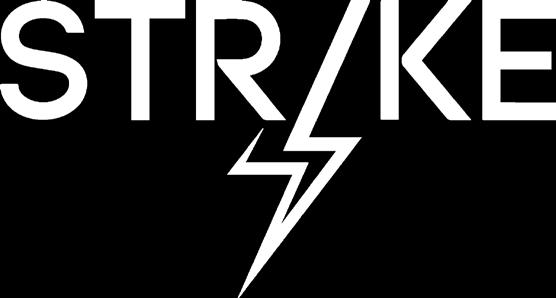






Our childhood experiences have a way of creeping into our adult lives. The child inside of us never leaves and manifests itself into pieces of our future selves. We are at the age where we’re adults who still feel like kids.
For our sixth issue, Strike Magazine Orlando embraced the resurgence of that inner child, highlighting the parallels between adolescence and young adulthood; figuring out who you are all over again; reflecting on what your childhood self would think of you now.
As you tenderly flip through the pages of our latest issue, we hope you feel encouraged to revisit your childhood memories in ways that you haven’t before. Let your inner child read it and see what they think.
Face the monster under your bed – nostalgia isn’t always how we remember it. Cry on your birthday because getting older is scary – we can’t always act our age.
Don’t share your dolls if you don’t want to – it’s ok to live by your own rules. Thank your childhood stuffed animals that would always listen when you needed a family member – sometimes stuffing is thicker than blood. Dive head-first into the water – whether you know what lies beneath or not.
Adulthood reflects childhood. So, open your old toy chest and take in the nostalgia – even if it makes you feel sick.
Listen to the kid who lives in you and tell them that it’s okay to make an appearance every once in a while. Without acknowledging and owning our past, the future will feel the repercussions.
Let issue 06: Sick on Nostalgia bring you back to your past and guide you through the moments, feelings and experiences that made you who you are today.


photographers haleigh grose
keelyn hennighan
riley karekos
camila mojica
valentina ramirez
jackson ring
videographer roberto gonzalez
nichole hojas
estephanie ortiz
jackson ring
video director skip
editorial director
melissa donovan
editorial assistant
nina rueda
art/merch director

nayla villafañe
lead art assistant
jillian proudfoot
set design director ashlyn buckman
set design assistants callie cleary addea coleman
icarus evansen
kinou louis-charles
emily paul
beauty director
katherine polgar
beauty assistants
coRa brady
alaynah gurung
deanna kinchen
kellen stephenson
styling director
niah aleger
editor-in-chief alexandra sullivan
creative director
grayson keglovic
external director
josh arden
editor-in-chief assistant marie brooks
creative director assistant gabby macogay
external director assistant joshua jacobs
styling assistants
kiara alamo
angelina curatelli
marc anthony miller
sid theobald
writers
kendal asbury
rose avelo
tatiana brown
event assistants
lucas castro
isabella diaz
maggie gamson
sarah harwell
sophia hodges
amesha tiwari
maya watson
lauren widener
jaya wilson
brand ambassador director
claudia orisakwe
brand ambassador assistants
rylee collins
roberto cotto
eliana jacobs
ellie nas
richard rentz
morgan ryan
patrick ryan
olivia wagner
copy editors
reanna haase
marian sumerall
emma twilley
nicole vasbinder
jenna weiss
blog/web coordinator
delaney gunnell
social media director
nick flood
social media graphic designers
mara garcia
nicolas polania
isabelle gambrill
devan gipson
amanda janvier
belle kinney winnick
erica plauche
maggie sofield
kennedy weinstein
zine team director
amanda turko
zine team assistants
lauren campbell
dominique evans
abigail johnson
katrina lashinger
juliet marcus
anya mathur
daniel morales
trinity pearson
michael walls
irene triantafyllopoulou
social media assistants
jalenah darby
makayla gray
janell guillen
daniely rivera-martinez
mason snowden
calynne thompson
pr director
gabe garcia
pr assistants
isabella acosta
ellie cabeza
art assistants
hailey kammerer
kiera mayott
anna mclean
nicolas polania
finance director
cherry rowe
finance assistants
megan danh
ana garibachvili
megan leombruno
lydia velasquez
morgan christie
madison goran
anjelica llanes
carla moceri
claudia orisakwe
emily peña
event director
nya hearn



 by Olivia Wagner
by Olivia Wagner
 MONSTER MONSTER MONSTER MONSTER MONSTER MONSTER
MONSTER MONSTER MONSTER MONSTER MONSTER MONSTER
Monsters aren’t only under our beds, they’re on the big screen too. This isn’t anything new, since the dawn of cinema, monsters have been created to inflict fear on society. Let’s go further back in time and remember the creation of “Frankenstein.”
While this monster seemed to be created by its scientist out of greed for remembrance, Frankenstein’s presence as a whole reflects the subconscious fear of death. Since we’re unaware of what happens beyond death, we tend to substitute it with stories, beliefs, and ideas, thus the concept of Frankenstein. We cope with the fears of humanity by creating the opposite of it- monsters. These personified symbols’ presence parallels humanity’s darkness; hence, their use in films acts as a mirror of ourselves and the fears that brew within us all.
Frankenstein being a manifestation of immortality isn’t the first, as there have been reiterations of the same concept. Dracula, for instance, a literal immortal being, feeds off of the blood of those who live. Dracula’s thirst and hunger for human blood represents humanity’s need to survive, an innate feeling that is continuously nurtured and presented by the media. These monsters are specifically constructed to emulate the terrors that exist within all our lives. They can’t just do this by lurking under our beds, these creatures had to infiltrate our movies as well.
Having been introduced to the golden age of cinema from quite a young age, I was able to pick up on this strategy when it came to characters, or in this case: monsters. Many horror films will take classic fears and personify them into these monsters that the protagonists go throughout the movie trying to conquer. This ultimately brings a sense of unity between the characters and the audience watching. As unity is felt with the protagonist, the discomfort presented by the monsters is intentionally alleviated.
The fear of death presented by both Frankenstein and Dracula isn’t only disguised by their immortality, but by their nemeses. We, as the audience, are meant to root for the protagonist, which simultaneously reinforces the fear while telling us that fear is immoral. By learning to fear death, we eventually will. This is what makes the monster appear frightening. Consequently the continuous reinforcement of a mon
ster and the conditioned fear of death makes the experience for the audience more universal, as it is something we are all expected to be afraid of.
The relatability between ourselves and the protagonists of the horror genre might just be what allows these films to flourish. Mirrored in the struggles of protagonists, we are able to see our own fears magnified. “Nightmare on Elm Street,” for example, is a horror movie about a serial killer; however, this monster instills an anxiety that is quite familiar. Freddy Krueger is able to enter his victim’s dreams, motivating the characters to stay awake. These characters are now driven to exhaustion due to their developed fear of falling asleep in hopes of not encountering Krueger. The monster himself, has now become a metaphor for our own subconscious fears we choose not to face as Krueger becomes this personified form of apprehension. The fear of going to sleep because of what we may experience within our dreams has been brought to cinema as this ghostly ation, intensifying this common anxiety.
Alongside Freddy Krueger, Pennywise, the murderous clown from “It,” uses fear to project the inner turmoil and insecurities of his victims. Take the main character Bill, who had lost his brother Georgie due to Pennywise’s manipulative tactics. His experience of grief throughout the film is illustrated through the clown’s various illusions, as he still believes that his younger brother is alive. One particular illusion entails Georgie eerily standing inside a flooding basement as he repeats, “You’ll float too.” The desperation to save his brother allows Bill to disregard Pennywise’s tricks, which are a painful representation of his denial and overwhelming experience of grief. Pennywise as a monster is versatile, in that he is able to exploit his victims’ thoughts and cloud their sense of judgement, thus acting as a mirror for Bill to confront his fears. His abilities as a monster further emphasizes that confronting ourselves and our fears is uncomfortable, thus we use outlets to hide those fears rather than directly facing ourselves. Pennywise is subconsciously an outlet for Bill, as his illusions fuel his denial of Georgie’s death and prolong his experience of grief. As for us, we use monsters like Pennywise to project the worst of humanity, using blood and gore as common illustrations.
While being projections of ourselves, monsters
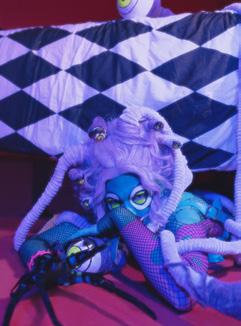

can also reflect the fears people have about each other. Take the film “Jennifer’s Body,” whose antagonist, Jennifer, is a textbook cheerleader- popular and pretty. Jennifer feeds on boys, using seductive tactics to lure them in before horrifically killing them. Women who were seen as promiscuous were villainized, hence the creation of the good-girl trope. However, Jennifer being the antagonist wasn’t a punishment but rather a symbol of power, as she chose to feed on boys (who are usually in positions of power in the horror genre). Seeing men as insignificant, Jennifer’s decision to kill boys reverses the notion that women are unable to hold authority and are often subject to hysteria rather than taken legitimately. Depicting women as subordinate to men made men feel comfortable in their jurisdiction, yet “Jennifer’s Body” disrupts this, allowing Jennifer Check to fall into the well-known femme fatale trope. Jennifer is reflecting the fear that men have regarding women in power, while using her monster-hood to uplift and provide comfort to women when expressing their sexuality and femininity.
In studying cinema, I’ve been able to realize how simple it is to begin to understand the surface level of humanity through these formulated monsters. These creations from our favorite films have been calculated to reflect our deepest fears that we wouldn’t typically announce. Although frightening, these monster-packed movies can ultimately bring society together, demonstrating we aren’t really that different after all.

“We all grow up with this shared nostalgia, watching and fearing these same creatures from under our beds to on our screens, finding comfort in knowing that we aren’t completely alone.”
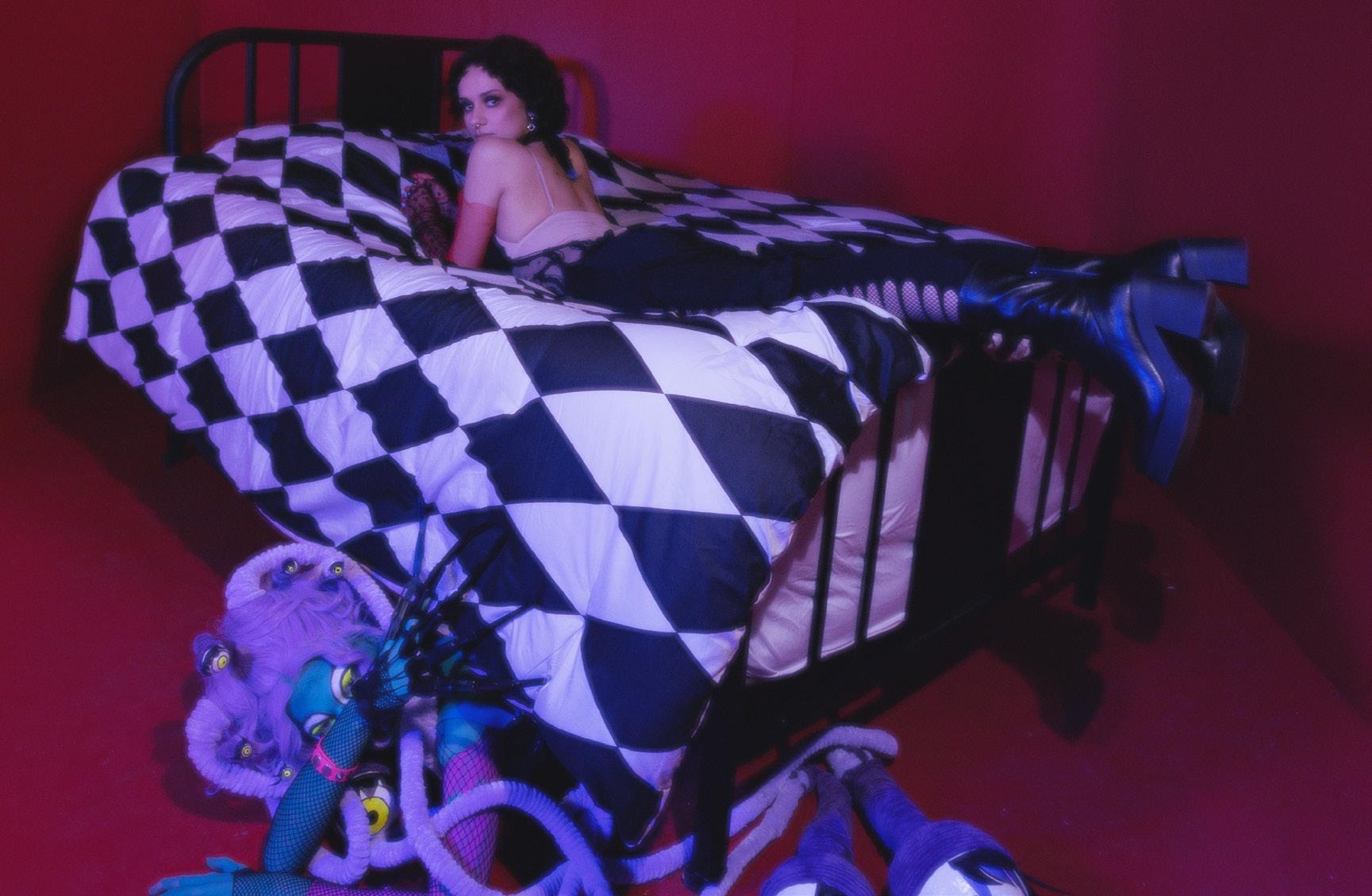

We have all experienced it. You are sleeping. Peacefully, or not so.

Then you shake awake.
What happened? Why did this hap pen? There are many theories on this dream phenomenon. Howev er, a collective idea among dream analysts is that falling in a dream could mean you are not grounded.
Now what does this have to do with you? The American Acad emy of Sleep says you may have lost control in some as pect of your life. Are you afraid of losing your job? Are you paranoid that your significant other is cheating on you?
The possibilities when dreaming are endless. Some dreams return night after night. Some good and some make you fear bedtime.
When I was younger, I was afraid of the ocean. The force, power and darkness scared me. Every time I would go to the beach with my family, without failure, I would have a night mare about being lost at sea the following night.
Some things never change. Sometimes I still have dreams about being lost at sea, except my relationship with the ocean is very different now. I see beauty in its power, and I believe its force is often misunderstood.
So, what does that dream mean? Why would I imagine myself panicking and waving to the shore as a rip current pulls me out farther and farther? Dreams of drowning can be traced back to being overwhelmed. Being overpowered by the waves can be a sign of overworking yourself and fear of not meeting the expectations of the people around you.
As we grow, the meanings of our nightmares change. You are no longer dreaming of all your teeth falling out because you didn’t brush your teeth before bed, or because you ate an extra slice of cake when your mom told you not to. Now there is a whole list of reasons why your subconscious would create this reality.
dream is no longer just a monster, it is guilt.
Analysis of your dreams can lead to deeper self-reflection and growth. Being lost and not being able to find your way back home in your sleep, could mean some of your personal boundaries have been broken.
Some might say finding meaning in your dreams is pointless because it often is not backed by research. But analyzing your dreams can provide an inside look into your emotions and thoughts.
Because of this, when I was in high school, I was given a dream journal by my younger sister. It was a place to not only write down my dreams, but to look up the meanings. This is what made me realize that there can be a rational explanation for the materialization of my irrational fears.
Your monsters may not seem real, but they are more real than you may have ever believed. Your dreams might be trying to tell you things you would never confront when conscious. So you may want to pay attention to the dream you are trying so hard to forget.



It is the gum underneath uneven tables. The paper cuts on your fingers after organizing a project just hours before it’s due. The coffee breath. The “shut the hell up” to your alarm in the morning, a plea of exhaustion and uneasiness. Everything we have always hated coded on a broken record. In those moments before your head hits the pillow, only to wake up in dread the morning after, you realize the monster that has been following you your whole life is not only behind you in your elementary past, but in your academically draining future.
Life is tiring. When you’re out having a good time with your friends or shoving your face with Mexican food on a Friday night, everything seems like a clear-cut set of diamonds resting on your glowing and worry-free face. But in the back of your mind, like the shadow of fingers obstructing your view, everything gets broken down into a blurry perspective. The crown on your head melts and the anxiety eats you up all over again, reminding you of the exam you have Monday morning that ultimately decides your future.
Sometimes, I’ll remember the moments that made me feel isolated as a young girl. I’ll have chilling flashbacks of times where I would have to crawl to the other side of the classroom just to get an assignment I had forgotten to complete. The verbal punishment and embarrassment was too much to handle. Yet, I could never avoid the yellow teeth of my teachers grinding back and forth, waiting for my now petrified body to turn around and face them, empty paper in hand. But why should these moments cause so much stress?
As someone who pushes herself to the limit, I have always been aware of the chains of the education system. When you think you finally have time to relax, another notification pops up reminding you of the next thing you have to do– or forgot to do. It’s limitless and it makes you wanna pull out your already gray hairs. Half of the time, the work we’re required to do feels useless. It has nothing to do with what we want to pursue, and that in itself is discouraging. Why do our passions have to be diluted and our work ethics challenged with average yet difficult courses? Is our drive not noticeable enough from the starting line? What else do we have to prove?
by Nina RuedaI’ve tried proving myself. Sometimes, it makes me feel good. Other times, my knowledge is questioned and I feel stupid. The fear that enveloped me whenever I raised my hand as a child, just to be shot down in front of the class has always left a bad taste in my mouth. I have put so much of myself into my education just to cry into a pillow and wish it all away. But it continues to stick with me, like a shadow. I try to remind myself that it’s a good thing, that these difficult times will grant me a life of complete satisfaction. But how much more can I take?
As a student, I feel like I am drowning in work and embarrassment. Every failure, every rejection, every strike to the heart when you miss an assignment. It all leads to an endless cycle of unbearable stress, transforming a “try harder next time” mindset into an “I quit” one.
But if we quit, what else can we do? If we quit, how will we ever be able to laugh in the face of those useless two-response discussion posts and chant “I finally beat you!”
You have to bust your ass, my dad likes to say. Life as a student is never going to be easy, but we only have one life, and tears are a reaction for a reason. So we cry and want to throw our textbooks against the wall every once in a while. It isn’t inherently a bad thing. This monster that we’ve come to despise over the course of our entire life haunts us every day, but it motivates us, inspires us and keeps us going even when we think we can’t anymore.
The monster is the voice in the back of our minds reminding us of our priorities, but it’s also the part of us that doesn’t like to see us quit. Our monsters allow us to realize that our worst memories were created from the drive to do better– to not fail. Though the pulsating fear of our creepy teachers are situational, it’s merely to push us to never have that feeling again.
The little me that refused to fail would hate to see her future self give up. The monster under our beds is the friend we’ve always needed academically, and the sticky situations we’ve had as grubby middle and high school kids have shaped us into adults who are sure as hell tougher than they think.
It’s time to embrace the monsters that live under our beds on a school night. We’re all familiar with the concept of due dates, and it’s time we submit an enthusiastic response to the fear of education itself. Our childhood monster, the one that has grown bigger over the years with challenging courses, has finally met its match.

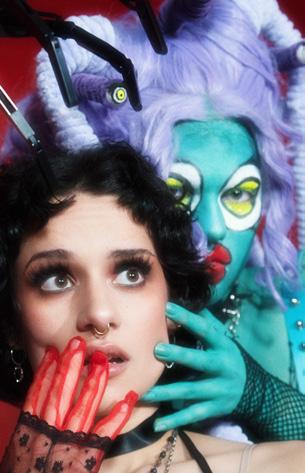
“It’s your monster, but it’s time to own it.”
Her childhood was an illusion.
Those were Noah’s thoughts as she shielded herself in sleeves of sheets from the cognitive distortions creeping in the shadows. It was 3:00 am and she was awakened by another nightmare. Used to being reassured by her mother that monsters aren’t real, Noah still felt anxious and uncertain. Similar to one emerging from a coma, Noah always fell asleep wondering whether she’ll be dead or alive the next day. Growing up watching Monsters Inc, Noah always prepared for someone or something to scare her. To protect herself, she always slept with a plush pug. However, as she grew older, the idea of stuffed animals shielding one from pain began to diminish.
Once she grew older, Noah slowly discovered the shows she saw were not reality through fever dreams. As her world aspirations began to increase, Noah’s expectation to prosper only made her more fearful of her future fate. To run away from reality, Noah would sleep away her horror.
Unbeknownst to Noah, the horror of her reality was only the beginning.
Noah’s dream is a kaleidoscopic range of delicate dreams transformed into nerve-racking nightmares. In each of her dreams, she would start with a fluorescent fantasy. In some variations, Noah would be traveling the world, in others, Noah would lie by the beach journaling her plans. Nevertheless, in each dream, she felt free and in control. She felt whole. Her dream then took a dark turn.
Swimming through a sea of dreams, Noah held her breath and closed her eyes from drowning. As she slowly immersed herself in her deepest thoughts, she fell into a cosmic catastrophe, changing everything she once knew.
by Eliana JacobsUnable to differentiate the polarizing depictions of perception vs. reality, Noah found herself slowly falling down this time in a rabbit hole.

After lifting herself, Noah sat in silence, pondering the meaning behind her dream. She wondered why in every scenario, good or bad, she chose to run away. Noah reminisced about being a child, always running, either in the playground or when she was disappointed.
The idea of expecting the unexpected scared her.
Noah realized the monster under her bed wasn’t the Bogeyman, but the fear of what was next. The fear of starting over. The fear of having to relearn everything she once knew society made out to be.
Running out of time like Alice through the looking glass.
While hearing “tick, tock”
Mad as a hatter, Noah frantically began to run and overlook all her past actions that would lead to her future.
Before she could see her fate, her eyes opened as she gasped out loud. Her nightmares always ended abruptly. However, this time, she discovered the recurring theme in her dreams.
She realized while she was young, she avoided the consequences of life. All life demanded of her was to be a good child. However, as she grew older, she felt society threw her into the wild, expecting her to know how to prepare for the worst.
The thought of the unknown and running out of time. Now 25 years old, Noah felt like society placed a cadence she needed to dance to.
A synchronized symphony dances to society, and any misstep is subjected to lifelong judgment. However, despite childhood not preparing her for the dark truths of adulthood, Noah did learn one lifelong lesson through film.
You are the author of your story.
Noah no longer wanted to live life through fear or someone else. She wanted to embrace all the lessons she has yet to learn to gain blessings.
After reflection and realization, Noah fell back to sleep, throwing away the watch of society’s expectations and milestones. When she woke up, Noah embraced a new beginning. However, she kept her plush pug as a bedtime story to tell to her future self.
“A wonderland within a black hole.”

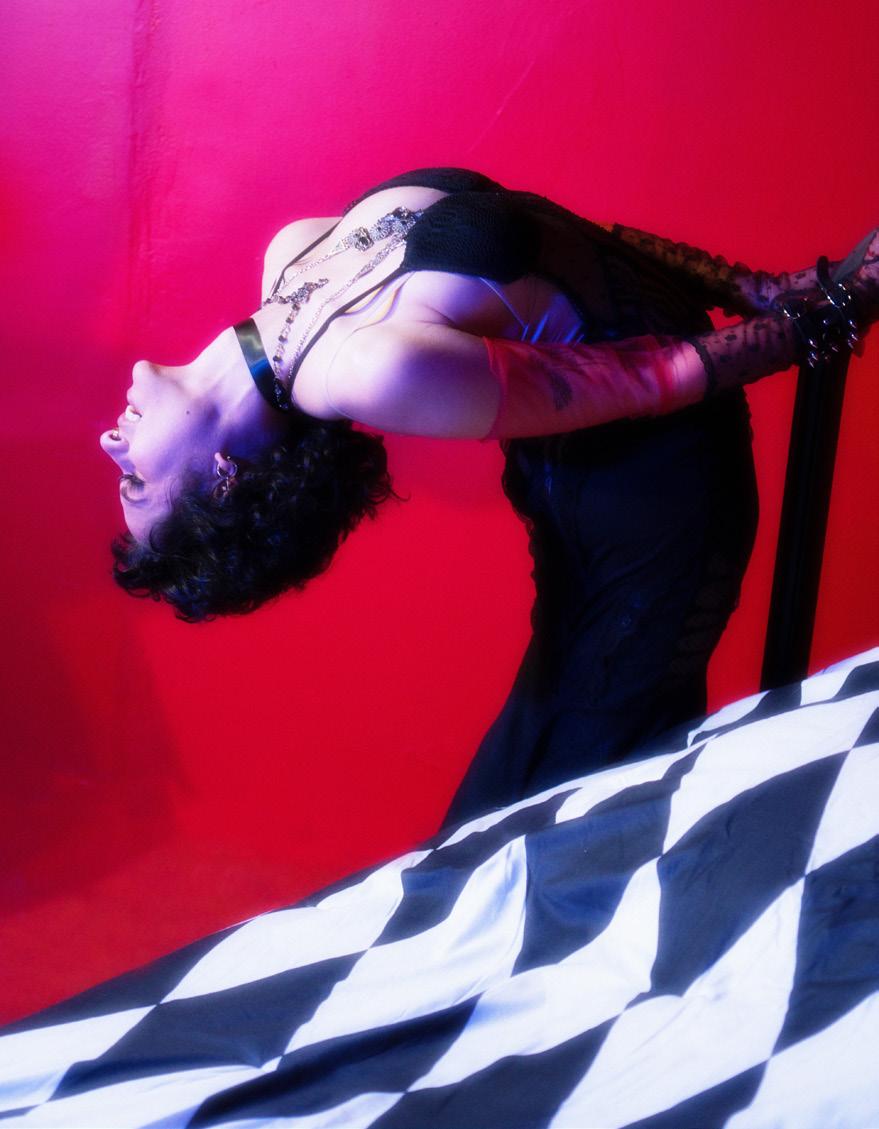

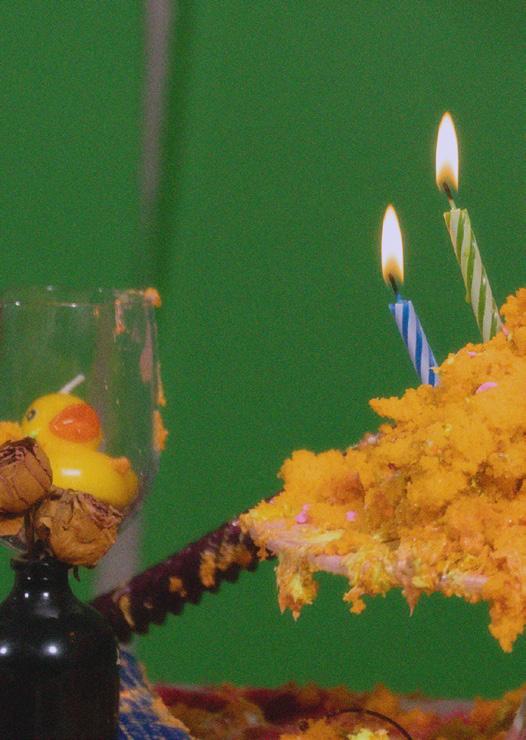


DON’T TELL ME TO ACT MY AGE DON’T TELL ME TO ACT MY AGE
DON’T TELL ME TO ACT MY AGE DON’T TELL ME TO ACT MY AGE

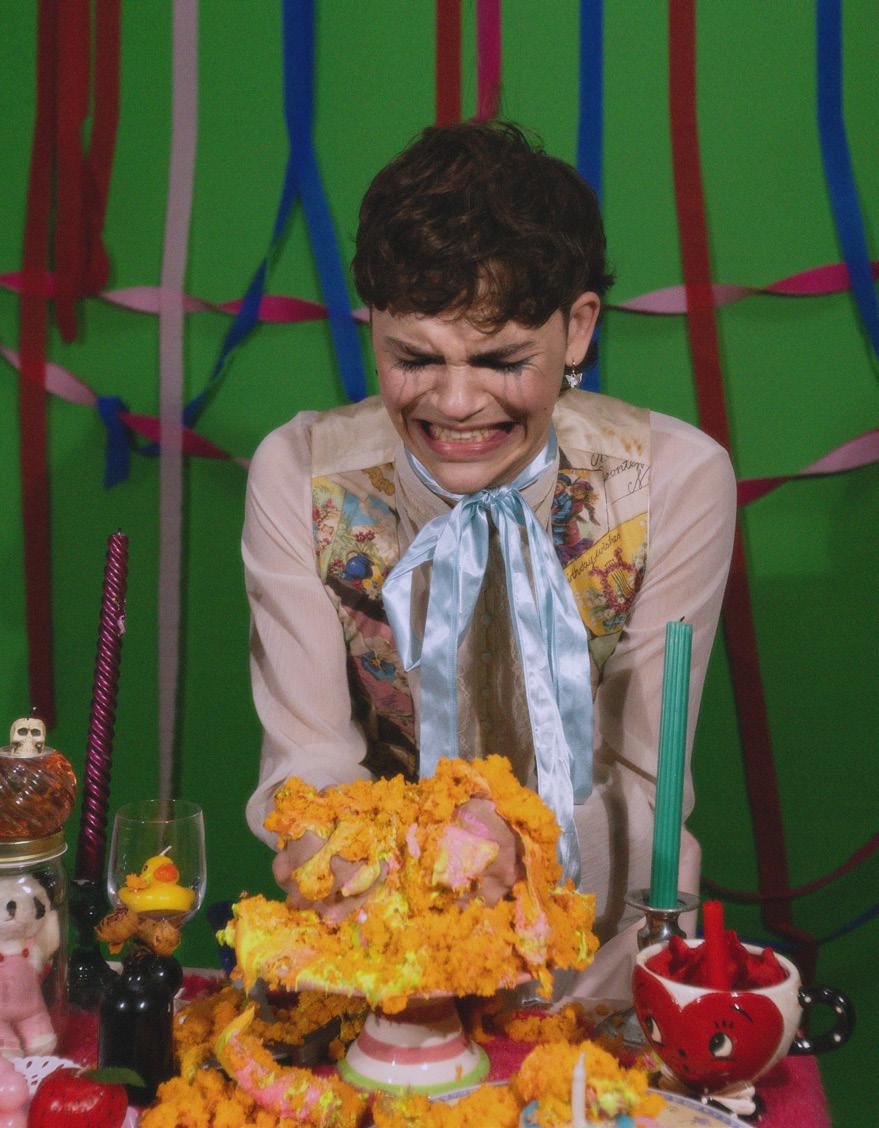

My age is not just mine. My age is also my twin sister’s. It is a shared cake, two halves of a whole. One birthday was Disney princess themed, another year was Barbie. We blew out the candles together and made our wishes at the same time. A birthday with her was all I’ve ever known. Now, it’s two separate cakes. Our eighteenth birthday passed in November. We blew out our candles and made our wishes at different times, on opposite sides of Florida, celebrating our special day with different friends. It was a bizarre experience to blow out candles on my very own cake for the first time. The day felt incomplete without her accidentally blowing out my half of the candles. Of course, being responsible for our respective engineering or nursing classes, we could not physically be with each other. Facetime is our best friend in our free time. This is our reality of growing older.

Now that we celebrate on our own terms, we’ve accepted it’s still not going to be the same as when we were younger. Never again will we be five years old wearing matching outfits, leaning over to blow out the candles on our over-the-top three-tier princess castle cake. No more joint birthdays at Pump It Up or never-ending fun at AirHeads, complete with a large cookie cake in the back room.
When we turned sixteen, we celebrated in harmony with a huge sleepover at a beach house.
When we are twenty-one, we plan to celebrate by being dunked in FSU’s Westcott fountain at the stroke of midnight.
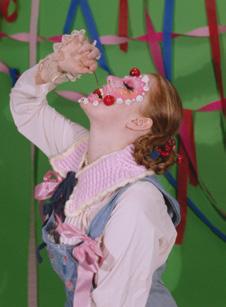
This doesn’t have to mean we are growing apart. I still make the four hour drive up to her college town to visit her every-so-often. For a weekend, we share the same air, the same memories, the same life. I like to play with the idea of living in the same space as her again. But each Sunday night when I’m obligated to leave, it never gets easier—the last hug and a “see you soon”. The empty passenger seat taunts me on my four hour drive home.
My twin and I don’t even look the same. We aren’t mirror images. We are fraternal, basically sisters who happen to be born on the same day. Our birthday is what makes our special relationship the definition of twins. I’m a bit taller, she has darker hair, I’m quieter, she’s the life of the party. Nevertheless, our mere affinity does screw us over, from her picture being used as mine for senior superlatives in the high school
yearbook, to not being enrolled in a class at the local community college because another girl with the same last name also applied for it.
Growing up a twin forged me a dependence on my other half. We shared the same friends, the same teachers, the same car. Sometimes I swear I would’ve made no friends without her when I was younger. She brought me out of my shell and was a constant in my life. Now that we’re separated by hundreds of miles, birthdays represent another year of growth and independence—an unfamiliar concept to me. I always had someone to tag along with me to school, Target, Starbucks, or wherever life took us. I realize now that I miss that companionship. Growing up is lonely. Independence is overrated.
I remember last summer when we attended our lifelong friend’s graduation party together. For Wthe longest time, we ended up talking with her grandma’s sister, who happened to be a twin. She rejoiced in our twindom and spoke passionately about her other half. She shared with us her necklace, which had the intricate lines of a thumbprint on it. It was her twin’s fingerprint, and her twin has hers. You were able to run your finger over it and feel the ridges. Through distance, they still had part of each other with them. The sentiment was elevated when she revealed that her twin had unfortunately passed away. I cannot fathom losing your other half, and I don’t ever want to have to face that reality.
When we are thirty, maybe we’ll be taking a flight from different cities to meet and celebrate our day together.
When we are fifty, I imagine we’ll be celebrating being half a century old with our partners, eating a chocolate ganache cake from Publix at the dinner table together, reminiscing on our past birthdays.
When we are seventy my hands might shake too much to be able to write her a card.
When we are eighty she might not remember how I’m related to her or what my name is.
I can’t tell you where life is going to take us, but is it selfish to not want the clock to strike midnight anymore?
Birthdays mean one step closer to uncertainty. One step closer to the inevitable. My age is not mine, and I’d rather it never not be.


I’ve heard this said about me more times than I have fingers to count on. All at once,

unconfirmed syndrome as the intense personality trait of somehow carrying loads of pressure that are too heavy to hold and the fear of letting people down, all while crawling towards the becoming of a ‘young lady.’
When you’re the firstborn, pressure is a fraternal twin, born beside you. When you’re the firstborn daughter, pressure is a friend to your venous system, flowing inside your body from limb to limb. For firstborn daughters, pressure comes with existence and existence comes with growing up too quickly.
For me, pressure is a familiar friend and a major symptom of Eldest Daughter Syndrome. Society places pressure on females from the ripe age of freshly delivered, and I have felt this weight on my shoulders since my brain was developed enough to remember. I know pressure well. Pressure to have it together all the time, to succeed, to be remembered. Pressure to be a good daughter, a good sister, a good friend and a good lover. Pressure is engraved in my brain, circulating through the crevices of my cranium and running from side to side of my skull.
Accompanied by the unavoidable friendship of pressure is the involuntary experience of growing up too fast. Emotionally developing ahead of my age left me with a motherly instinct that is reflected in most of my relationships. Whether it’s peeking through the layers of an affair with my most recent boyfriend or the controlling nature I have when leading staff, you can see from the outside looking in that I had years beyond my age. My mother has always made a point to announce that, like most girls, I matured much sooner than my youngest and only brother.
The unannounced anthem of an eldest daughter is “Moon Song” by Phoebe Bridgers – at least for me. This song encapsulates every symptom of Eldest Daughter Syndrome.
My Moon Song is to care for my younger brother, feeling guilty when I can’t be or am not there. To be the “dog with a bird at your door”—a people pleaser with a bad habit of putting others before herself. To give someone the moon regardless of what history has taught her. To be the oldest daughter and to have all eyes on you.
The most meaningful pair of eyes that I feel on my every move is that of my brother. As an eldest daughter and an older sister, I, and everyone around me with an opinion, hold myself to a high standard. This standard consists of setting the precedent of right and wrong. I try to be careful with my words and actions in regard to how they will affect him. My brother is just that, my sibling, but he is also my best friend and I look after him as if I were his guardian. Throughout our entire lives, we have leaned on each other through the bad and the ugly, leaving me with a feeling of responsibility to protect him, even when I live over seven hours away.
The guilt I feel when I can’t be present for a monumental moment in my brother’s life is similar to the feeling I experience when I let someone down. I don’t care what people think about me, but I do care about how I make them feel – a bittersweet trait to have. The need to please those around her is another major symptom of Eldest Daughter Syndrome, a partner-in-crime to the immense amount of pressure an oldest daughter can feel.
An eldest daughter can feel alone in a crowded room. I have been there and I am there. But, to be the oldest daughter is to help people. Though helping others at times may come with self-sacrifice, this is an unwritten description of being the fated eldest daughter. Being ill with Eldest Daughter Syndrome is nothing to be embarrassed of but something to be proud of. As an eldest daughter, it is impossible to Act My Age; but without eldest daughters, bloodlines would not flow how they are supposed to. Without eldest daughters, what would our younger brothers and siblings do?
Pressure makes diamonds, They say. But the weight I carry leaves me a stone, Frozen in time. Pressure builds, And I am merely tumbled.
-G. Keglovic



Last summer, I spent a month in Italy and found myself in the Uffizi Museum in Florence. I stumbled across a serpent-framed face painted with utter shock, all displayed on a shield. Caravaggio’s rendition of Medusa had sightseers crowded around, muttering their own ideals of what she represents—how she’s earned her place as an angered and scorned monster. I grew angry at them for her and her story, how Medusa could simply be chalked up to a monster, how her story was lost in translation.
The myth places blame on her beauty—creating a victim-blaming and shameful narrative for her assault by Poseidon—ultimately being punished by Athena and turned into a monster capable of turning man into stone. She then was defeated by Perseus through decapitation, and was used to be weaponized on a shield. Her experience has been used for ages to disparage strong women and shove them into a place of obedience, completely ignoring that she was a victim before a monster.
Nowadays, feminists are reclaiming Medusa and her myth. As stated by Dr. Emily Erwin Culpepper, director of Women’s Studies at the University of Redlands,
“The Amazon Gorgon face is female fury personified. The Gorgon/ Medusa image has been rapidly adopted by large numbers of feminists who recognize her as one face of our own rage.”
Seeing her on the shield, knowing the ignorance around her and her story, and being reminded of the labels such as crazy and hormonal which are degradingly placed on angry women evoked a need to enforce that we aren’t the problem—the cause of our anger is the problem. Despite lifetimes of cultural conditioning on how women should be, it’s time for reform. It’s been ingrained in our heads that sadness is acceptable and altruistic, anger is messy and unacceptable, and that anger in men is authoritative, but in women it’s hysteria.
Lilly Dancyger, editor of Burn it Down, built an anthology of 22
 by
by
writers expressing anger in their own forms. She gives a space for unapologetic anger, no matter how fiery and no matter their manifestations into pain, shame, and rage. It’s a ‘go ahead and scream’ cue to “...women who are so often reduced to sexual objects or babymakers, caregivers, mothers, virgins, and whores…” Whether in a book, in text, or in blatant conversation, women should be able to feel and express anger—and rightfully so. To be rightfully angry over reproductive rights and grievances, racism, and inequality being so casually ingrained in everyday experiences, the exhaustion from seeing rises in self defense weapon advertisements and “tips and tricks” to be alone safely. Uncomfortably laughing when cornered in unfavorable situations and fearing for your safety shouldn’t be so acceptable.
Anger isn’t hormonal or unhinged, it’s a form of self advocacy, a catalyst to action. What’s culturally dictated to be authoritative for men should follow the same attitude for women. Anger serves as a human reaction, as Bean Gilsdorf from Los Angeles Review of Books explains, a reaction to “...nothing less than the circumstances that threaten our autonomy, dignity, and personhood…”. Why should such a revolt be labeled as madness or instability?
Audre Lorde, author of her essay “The Uses of Anger”, argues against typical philosophies on anger being a vindictive and controlling emotion, saying it’s rather a method of survival.
“I have suckled the wolf’s lip of anger and I have used it for illumination, laughter, protection, fire in places where there was no light, no food, no sisters, no quarter… Every woman has a well-stocked arsenal of anger potentially useful against those oppressions which brought that anger into being.”
Medusa’s interpretation should no longer be about defeat, about her acts of strength and protection being misconstrued as weakness. Athena placed her head on a shield as protection, allowing Medusa to ward off evil; to do good. Like Medusa, women deserve to reclaim their anger and strength, and to take up the space that wasn’t given. Women have a built in array that should be used as fuel to enforce boundaries and defy oppression. We’re past the mindset of silencing women and placing them in a curated, quiet, and obedient mold. Gone are the days of resorting to sadness and being the controlled damsel in distress—there should be unalienable opportunities to use our voices, body language, and actions to take what we deserve.
As I am wrapping up my senior year of college, I have feared and dreaded being asked the impending question I was asked four years ago while graduating high school: “So, what’s next?”
This time it feels worse. The pre-set expectations of society have gone up a notch now that I am an adult and have a degree. Growing up in the world we do, it seems there are only two sure-fire, socially acceptable responses: going to grad school or working a 9-5. Which for some, including myself, may not be desirable at the moment.
It seems as if the answer to that awkward question does not meet the standards of the person asking, and there is a sense of disappointment and concern in the air.
I cannot count the number of times I have replied to that question just for people to look at me with raised brows, take a deep breath, and respond with “Oh… nice.”
It does rub me the wrong way that people who may not be relevant to your future, or even life at all, feel they have the authority to judge or weigh in on potential uncertainty you may be feeling, or plans you may have for yourself. It’s your life and you have to deal with the consequences of your decisions, not them.
Graduating college, while exciting, is terrifying. It’s the first experience for most outside of a structured environment like

school or home. Every year, my focus was on picking out my classes, worrying about the workload for the upcoming semester, or what other extracurriculars I should join. Within the span of the next few months, all that has been familiar will be gone and it will be up to me, and only me, to decide what this next “structured environment” will look like.
Being somewhat of an overachiever and a person who loves being productive, it can be a bit of a blow to the ego seeing people my age doing something conventionally impressive. I remember this past summer was different from all the rest. Many of my friends, who I spent many of my summers with, were not around as often. Some were off in other states participating in research programs or internships. Some were busy during the day working 40 hours a week at a place they would receive a post-grad job offer from. Others were working remotely. While I wasn’t as free as a bird, it was still a hard reality check to see the precious time I cherished having off of school and being able to do what we wanted without being tied to massive amounts of responsibility, had come to an end.
While I was taking some time off between my semester abroad and preparing for my final two semesters of college, I couldn’t help but compare. Should I be applying to internships right now? Should I have come back from studying abroad and immediately jumped into a full-time job? Should I update my LinkedIn? I felt behind in comparison to those
around me. And, it took me ages to realize that everyone has their path and success is not a “one-size fits all” category. So how can society be so close-minded on what success looks like and how successful you should be at the age when you are graduating college?
Some people have to embark on work for years and years of school after undergrad for their particular degree, or pursue something entirely different instead. Others may want to travel before jumping into their career. Whatever it may be, post-grad is not the same for everyone and as long as they’re doing something they’re passionate about, that is the true testament to success.
Most graduates, including myself, are in their 20s. I would love to speak with anyone who had their whole life mapped out at my age. How can someone expect us to answer questions, solve problems, or understand things that most people triple our age don’t? There is a well-known quote that reads, “youth is wasted on the young.” How are we supposed to fully enjoy our youth with bliss and ease when society is pushing set expectations and predetermined hopes on us?
While some may view the future as a set road to travel on to get to your final destination, there are many roadblocks and different exits to take. Just because it may not be the way that was expected or anticipated by others, does not mean the journey won’t have a wonderful outcome.







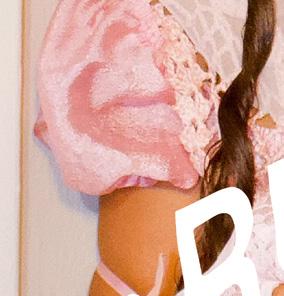


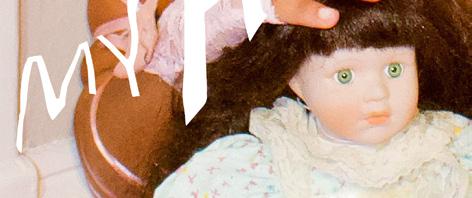



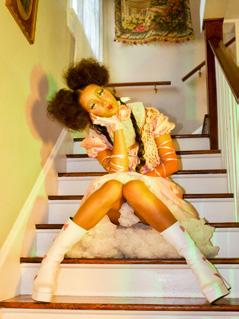

Every time Lorde releases an album, it changes my life.
The transition from “Pure Heroine” to “Melodrama” to “Solar Power” represents Lorde’s comingto-terms with herself, her adolescence and her adulthood. Growing up, I’ve always felt a strong connection to her music. Every time I went through a new phase in my life, it always seemed like Lorde was there alongside me just a couple steps ahead, reassuring me things would work out.
When “Solar Power” was released a few years ago, you can believe it had a major effect on me. Especially when the driving force behind the album was that you can’t continue to look to celebrities for such advice or idolize people you don’t know in the search for answers – you have to find these answers through your own personal experiences with life.
As an only child, I’ve had a lot of time to become comfortable with the concept of being alone. I love and cherish time spent just with myself and could never fully grasp the concept of codependency. I have an amazing group of family and friends and am pretty outgoing and social, but at the end of the day, I’m still my own best friend. It’s been said that the way we spend our days is the way we live our lives – so we have to ensure we enjoy the comfort of the one person that’ll always be there: ourselves.

But I also grew up a perfectionist, meaning I tend to be my own worst critic. I like to think that because I’m a Pisces I have this insanely in-tune emotional connection to myself and the people around me (which is the most self-absorbed Pisces sentence I have ever written), so I crave to understand every single aspect of myself, no
by Gabby Macogaymatter how much pressure that lays on. However desperate for an answer I might be, I still feel like at times I’m my own punisher, exhausting myself with how deep I get lost in my own thoughts. Who am I? What do I want? Why does it feel like I know myself but have also never met myself in my life? I am a daydreamer by nature, but sometimes I fall down the rabbit hole of picking myself apart and analyzing my every behavior in some kind of rotten attempt to make sense of it all.
Over time I’ve been able to diminish these inter
cides to text me back and will consult my closest friends to feed into my every delusion surrounding the situation. I still sob at the mere mention of Stephen Sondheim. I still feel an attachment to most of my childhood stuffed animals. I still love when my dad shows me his favorite songs on the guitar or when my mom and I get told we look alike because we have matching smiles. I still laugh out loud when I watch “Victorious.” I still see so much of myself in Mia from “La La Land ‘’ that I feel like I ghostwrote the script. I still love when people give me nicknames.
nal criticisms. I’ve realized there’s not much use in being so analytical of oneself all of the time. As cliché as it might seem, a lot of the internal pressure I faced was alleviated the moment I switched the way I thought about myself and the people around me. People are amalgamations of everything they’ve experienced and everyone they’ve known. What a disservice I would be doing not only to myself, but to the people I surround myself with to not appreciate every bit of who I am to the fullest – even my subtlest strengths or my perceived weaknesses.
Conquering such an attitude is difficult. It took time for me to come to terms with the fact that I’m not the same person I was when I was 10, when I was 15, when I was 20. We as humans are ever-changing, which is something special rather than something to be afraid of. But even as I continue to grow older, there are still parts of myself that remain constant.
I’m still the same girI who loves live music above all else. I continue to be a professional procrastinator. I still love ginger lemon tea and jasmine rice and peppermint milkshakes. I still dance and leap around my room when a dumb boy de-
But I’ve also become a girl who will correct someone when they mispronounce my full name. I’m finally able to keep multiple plants alive at a time. I’ve decided gold jewelry suits me over silver. I’ve laughed at way too many of my own Letterboxd reviews and made too many detailed Spotify playlists for my own good. I’ve stopped feeling so scared about Halloween Horror Nights. I’ve driven down a mountain in California and navigated the subway system in New York City. I have a new ear piercing that I got as an impulse decision in Atlanta one night. You will never know the same person twice. I love learning new things about myself and the people I surround myself with everyday. Some of my closest friends from elementary school are still my closest friends to this day, and what a beautiful thing it is to see who a person was at 5 years old and who they are now at 21.
In a way, this article is my “Solar Power.” A way to reassure my past self that I’m in good hands and to act as a stepping stone for my future self to launch off of. The next time Lorde releases an album (if Lorde releases another album, oh my god), who can tell what kind of a person any of us will be.
And although I write this in an attempt to exude confidence in what I’m talking about, I, like anyone else, still don’t understand it all and never will. But maybe that’s the point – we don’t ever need to.


When you’re a kid, you think you can do anything. I certainly did when I got a guitar in elementary school. Like most kids, I had visions of fame and success and the childlike confidence that I could make it happen. It’s hard to say when the naïveté of childhood wears off, but one day you look back and realize it’s been years since you touched your guitar and you don’t remember anything about your dream. I’m 20 years old now, and I’ve just picked up my guitar for the first time since I was 13. Here’s how I got there.
I started developing my taste in music when I was 11. I was just beginning to use the internet and spent hours watching music videos. This newfound interest inspired me to play
store where I picked out a gorgeous, shiny, black acoustic guitar. It was a little big for me, and it was hard to strum all six strings, but I wanted a guitar I could keep forever. The store also offered lessons, so that day I began learning to play from an incredible teacher named Kevin. Kevin could transcribe any song by ear, which gave me so much freedom and got me excited about learning music. I remember the first song I learned was Katy Perry’s new song “Roar”, and while I was super excited about this, my dad was not. I was told to ask about learning how to play “real music” like John Denver and was told that boys don’t listen to music like that. My parents repeatedly told me to stop talking about my favorite thing ever, and that was super confusing as a kid.
apeutic boarding school from 7th to 9th grade. I didn’t last long playing without Kevin teaching me, and eventually, my guitar got put in storage.
thing I wanted. Music became a large part of mydom culture online. It was my biggest passion but also the biggest reason I got made fun of— not for the music itself, but because the music meant Ining Ariana Grande as hard as I was while still pretending to be straight, but at the time I was mortified that my biggest secret so obvious. Between classmates and my parents putting down what I liked, the desire I felttar almost got stomped out. Kevin kepted, even going so far as to give mesic for artists like AC/DC to hidesic for artists like Lana Deltunately, I moved away and was then sent to a -
Being away from my family and peers at boarding school gave me so much more freedom to discover myself, but even still I dealt with homophobia from the administrators. Because it was a therapeutic school, they did things like throw away my Ariana cat-ear headband or tell me my homosexuality was a phase all under the guise of “treatment.” Over the years, I internalized all the homophobia—which is why I put down my guitar in the first place. My whole life, everything feminine about me was picked apart. Everything from the Webkinz I wanted when I was 5 to how I sat in a chair was “girly” and not allowed. This did nothing to stop me from growing up to be fruity, but it did ruin my self-esteem. Music was the one thing that was mine. Pop music was a perfect escape for me; it was a space dominated by femininity and full of glamour, confidence, theatrics, and great music. What was so wrong with that? Why was my one safe haven somehow inappropriate? I also felt like a walking stereotype; I loved artists like Beyoncé and Nicki Minaj, loved pink, did theatre, and had a voice sweeter than sugar. Femininity was shameful, therefore so was I. My dad wanted an Eagle Scout son who played sports with him, and here I was in my room playing Ariana Grande songs. It was either playing songs I didn’t like or feeling ashamed to play anything at all, so I quit. I spent years being insecure about all of my feminine traits, especially my music taste. Even today, it’s a sensitive subject for me. I still haven’t shaken the feeling that there is something inherently wrong with me.
 byRichardRentz
byRichardRentz
Now that I’m older, I am determined to live a fulfilled life outside of any expectations of masculinity. I’ve done a lot of work on myself, and every day I am trying to unlearn the homophobia I was taught growing up. I still get embarrassed and am hesitant to wear makeup or feminine clothes, but I know now that those are not my own opinions in the back of my head. I’m flamboyant and love everything feminine, from my clothes to my fragrance, music, and friends. My taste in music has evolved into something much gayer (if that’s even possible) and now I love it. Seven years ago, I was lying about what I was listening to, and today I am proudly terrorizing my Instagram story with Spotify links. I’ve spent years wondering who I would be if my true self were embraced growing up, and even though I’ll never have an answer, I know that whoever I would be would still play the guitar. Luckily for me, I recently found Kevin again and learned he now teaches guitar lessons over Zoom. I sent him an email, and finally, after seven years, I wiped off the dust and picked up my guitar again.
This time, I was able to reach all six strings just fine.
“Now that I’m older, I am determined to live a fulfilled life outside of any expectations of masculinity.”


Accusing someone of narcissism has become a tempting and enthralled insult in this modern time. An inclination of ease when faced with someone who appears to be entirely overweening, entitled or inordinately and exceedingly pleased with their own existence. But it’s practicable to ponder whether the word truly fits the glove worn by those of the bombastic and conceited type we’ve grown used to applying it to. And, a larger point, whether we’re really understanding, and in turn correctly addressing such origins of regrettable behavior to which it refers.
Behind our enthusiastic and hardy use of the word lies an implicit aspect of human nature: people call for undue attention for themselves, roll around pretentiously and are inclined to bombast when - at heart- they feel drunk out of love for who they are. At the heart of their race to secure the admiration of strangers is their soaring estimation of themselves in combination with a husky pride in their individuality. Even so, such agitation and peacock displays cannot solely stem from a safe haven of feeling perfectly and distinctly enamored with oneself. In reality, those who have loosely been called narcissistic cannot actually think so well of themselves; most boast and scratch for attention since they have found no way to feel anywhere near sufficiently content with their being internally. Then, a certain dizziness is achieved by driving in quick circles out of a manic and haunting terror of their own mediocrity and invisibility. Associated behaviors of narcissism - the greed, the lies, the vanityaren’t symptoms of any self love. Instead, they whisper proof of its hollow and tragic absence.
Such origins of the word come from the Greek figure Narcissus, an ancient hunter from central Greece, a handsome lad with long blonde hair and enchanting eyes. He fell dangerously into a profound love and obsession with himself after finding his reflection in a stale pond. Framed in this way, narcissism seems laughable and absurd. Natheless, derogatory remarks have blinded the genuine benefits for having been allowed, in youth and under the kindly tutelage of caregivers, for proper admiration of oneself free from reservation. To have been allowed to strut and sing, and feel utterly warm in one’s skin and, for a time, feel ample delight in the sheer wondrousness of one’s own existence.
Through this lens, there might be such a thing as healthy narcissism. To be lost in a phase of coming to love oneself is the precondition for learning to love anyone else. Worldly problems are conceived by those who do not love themselves. Who cannot confidently believe in worth inwardly. Those who have always known a soaring hatred and shame intertwined with who they were, now fail to halt their insistent reaching for attention of which they have been deprived. One must despise oneself really rather a lot before it may ever seem a good idea to devote one’s personal pursuit of being deemed valuable in the eyes of complete strangers.
By contrast, those of the truly self-contented are those among us who see no searing need for any adulation. Who understands how to draw a silent satisfaction from no more than their personal adorned and ordinary being. Self absorption does not
 by Patrick Ryan
by Patrick Ryan
bias or personal inclination toward a process or life happening is only the most important thought in the room to the person who thought of them. This thoughtful and unmalicious selfish behavior does not make the one acting anymore wicked. Instead, they are warranted in the pursuit of self preservation when correctly deployed in a non-exploitive or entitled way. Rightfully, one should feel confident amidst one’s permissive pursuit toward a doctrine of human freedom and a humble vanity. Most have wasted enough time doing that which they would rather not, and it should take more than the trip to elderage to grasp one’s inclination and truthful personal bias.
always befriend a lack of empathy. One’s existential preferences only supersede another’s when such preferences origination solely depends on the one. In other words, a person’s
Such focus should not be on a world where fewer love themselves, but where there are many more - a world fruiting with what we may now coin as healthy narcissism. There is room to be modest and self-effacing, ready to be quietly interested and attentive to others, smiling to forego unnecessary baubles or manic acclaim, when there has been time to gaze into reflection and think it is really quite nice. Enough so that we may go out and generously spread kindness and selflessness to our fellow humans.
“To be lost in a phase of coming to love oneself is the precondition for learning to love anyone else.”
You wake up with that same exhaustion you can never seem to shake. Burnout. A symptom of the grind. Corporate capitalistic corruption. Your brain easily supplies buzzwords from the previous night’s scrolling to your current situation. Almost everything you do falls into this fill-in-the-blank game; you have an experience and someone else describes it for you.
Your eyes are on your phone before the sleep is rubbed out from them. You’re brushing your teeth with your right hand and your left thumb is scrolling through video after video. You spit into the sink at the same time you see the solution to your trouble: a solo-date and self-care day.
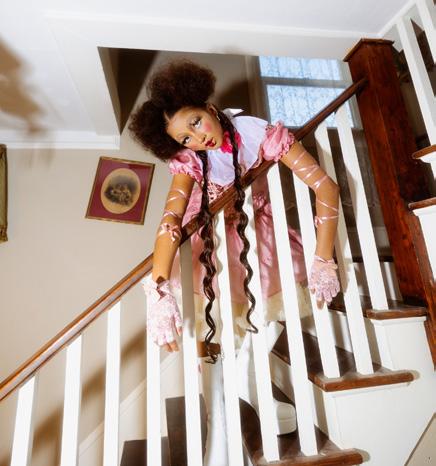
So, you clear your schedule and cancel your plans with friends to spend the day doing whatever you want. You flirt with the friendly barista and order a secret menu drink that your sister’s favorite vlogger introduced her to. You write out a text to your group chat to update them that he’s a ten, but he screwed up my drink and you decided against it. It’s your solo-date after all. Texting them after canceling plans would be the same as never canceling at all. But once you sit down at a table for two, you type the text back out and send it. Obviously, it’s not the same. This doesn’t count.
You take a picture of the drink before you take the first sip. You’re not compiling a highlights video in your head, but you’re also not not compiling it. Everything in the coffee shop suddenly seems cuter now that you don’t have anyone to point it out to. In your head, you see a girl posing there and there. The space is miraculously cleared of people, so the wall mural can serve as an unobstructed photo backdrop. You see her again when you gently toss your hair in the motion you’ve practiced in the mirror and sip your drink like a celebrity waiting for paparazzi pictures.
A disquieting thought comes across your mind: who is this girl that you’re picturing? Is she an influencer you’ve seen before? Is she a regular customer from work?

You shake the thoughts off. It’s your self-care day, you have no room for tangent paranoia. You’ll take your drink to go and have a hot girl walk. If you’re reconnecting with nature and finding ways to joyfully move your body, then there’s no way you can get caught up in the digital world or your superficial thoughts. It’s easier to be beautiful and carefree when you’re outdoors. Your group chat is blowing up and you laugh along at your friends’ stories about cute baristas who had some red flags. You have a comfort podcast playing in your head, two friends who are open enough that you can pretend you’re their friend too. The sunlight washes out your skin texture so you take this opportunity to snap a quick picture, to document it, just for yourself. You can’t help but wonder anyway: is it even possible to document just for yourself? Is there really no threat of an imagined audience or the potential that if a picture is actually really nice looking, you’ll post it later? The picture looks more like that girl than you usually do, wouldn’t it be a shame to waste it by keeping it to yourself?
The day is beautiful. You pause your podcast so you can have room to think about it. Your aimless walking took you to a small park: a playground surrounded by a grassy picnic field. A little boy plays on the swings and you’re oddly jealous of him. He’s truly enjoying playing by himself, without any distraction or input from others. You understand at once that you haven’t felt this luxury in years.
It’s been an entire day of being alone without ever once being by yourself. When was the last time you really felt alone? Not lonely, not left out. Those you’re all too familiar with. But well and truly alone, without the easy option of pressing a button and connecting with someone. Forget about your friends— are you ever really alone with this woman-shaped parody following you around?
Now that you’ve revealed her, it feels much too obvious. None of your actions today were your own; she was lurking in the shadows, pulling the strings. You went to an aesthetic coffee shop because you thought she would look good sitting there. You ordered a drink that she would. You texted your friends pretending to be her and imitated her in your gestures and pictures and choices and walk.
You took a day, not to care for yourself, but to curate her.
Suddenly all you want to do is go home and call your older sister. There’s no point in having a rest day if you don’t get rest, and there’s no reason to imitate connection when you have the privilege of having the real thing. You vow to be more careful next time. You don’t want to be her if it means sacrificing yourself.


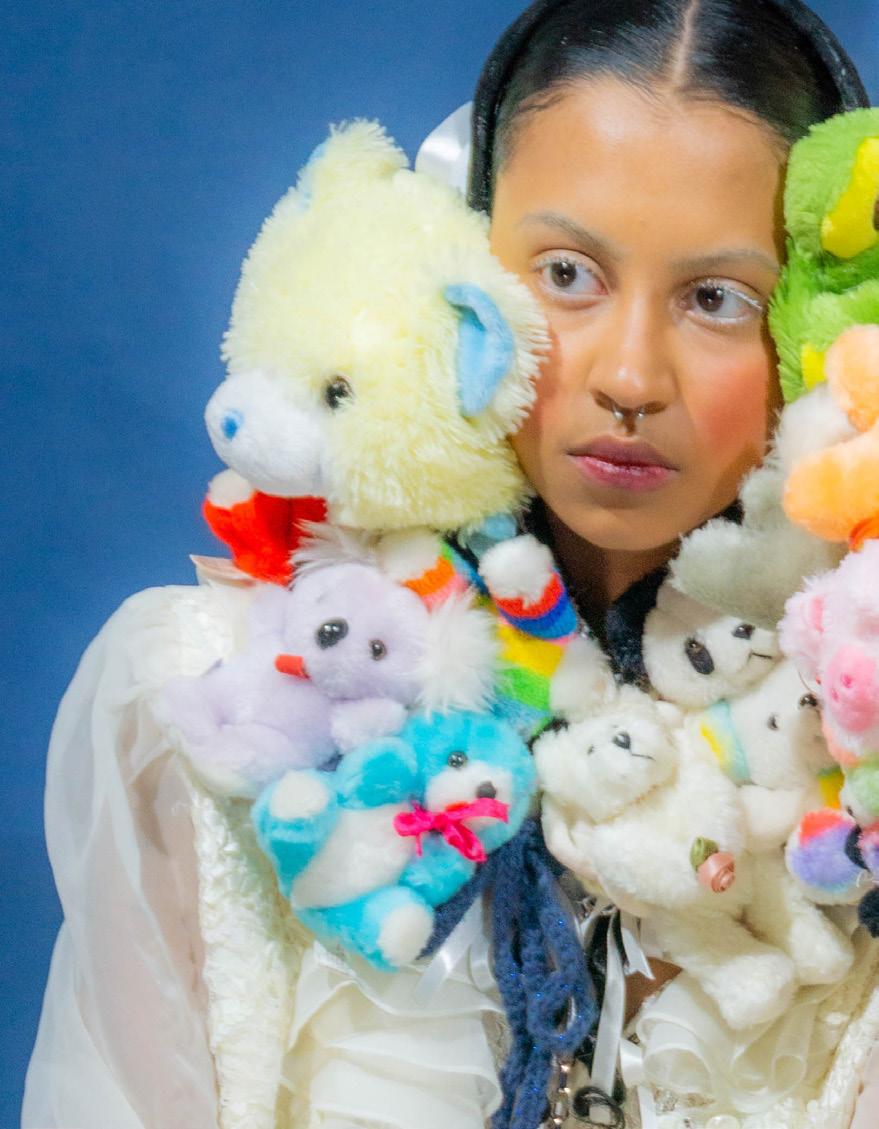
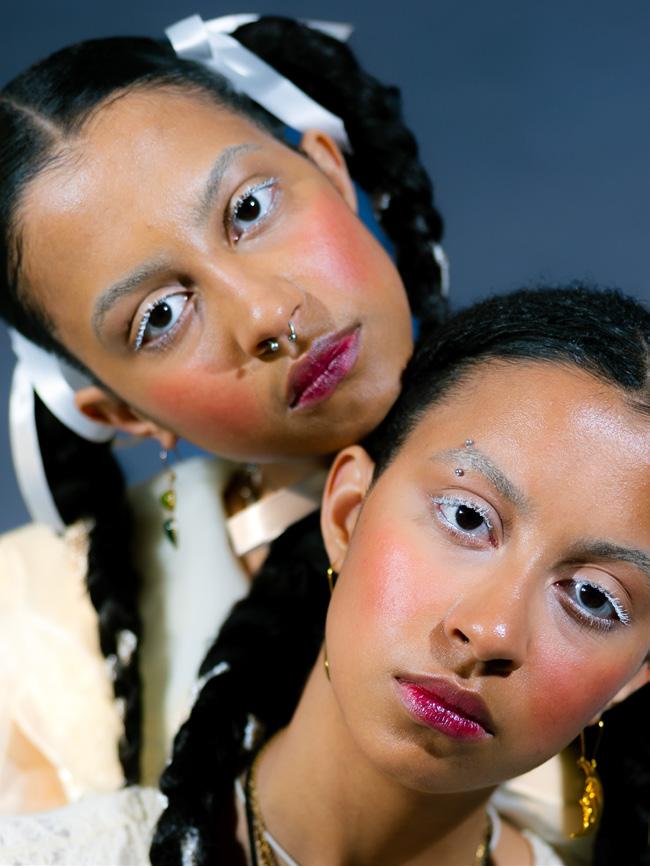

 by Alexandra Sullivan
by Alexandra Sullivan
I made myself a sister when I was 7.

My chosen sister grew up down the street from me. Every Sunday, she’d walk to my house and we’d bake double chocolate chip cookies for breakfast and play Super Mario Bros. She quickly became like a little sister to me — we’d share clothes, fight about silly things and spend every day together.
Growing up as an only child, she was the closest I could get to having a sister.
My chosen sister and I don’t really see each other anymore; we grew older. I went to one school and she went to another. We have different lives now, and that’s okay. She will always feel like family to me. She will always be a part of my life, and I’ll never forget the impact she’s had on me.
That’s the thing about friendships. If you nurture them and let them grow, they can last forever. Friends are family that come into our lives at different times and make waves. They can be someone you’ve known your whole life or someone you met yesterday.
My chosen sister is the first example I have of chosen family.
Chosen family can mean a lot of things to a lot of different people. For me, my chosen family is the friends who remember the little things about me. The people I can trust to be there for me during a hard time. The ones who are loyal and stick around, even when times get hard. The ones who make an effort to be there when no one else is. The ones that make me laugh until my sides hurt with happy tears streaming down my face.
I make a conscious effort to treat my friends like family. I approach friendships with the same loyalty and longevity. All of the people in our lives are here to teach us new lessons about ourselves and the world around us, so why not embrace it?
While the branches of my family tree belong to my family, the bark has been permanently engraved with the names of my chosen family and will continue to grow for the rest of my life.
Friends come into our lives and become factors in all of our experiences. I have had experiences — some good and some bad — with friends that have bonded us for life. They’ve become like family to me, even if we don’t talk all the time. It’s a bond that runs thicker than blood.
I made myself a sister when I was 15.
My chosen sister transferred to my high school my sophomore year. We instantly became friends, sharing the same passions for Harry Potter, Glee, music and theatre. We’d watch YouTube videos and stay up too late. We’d drive with the windows down and sing at the top of our lungs.

We also share the same worst day of our lives. What started as a code red drill became 17 lives lost. Our high school became a crime scene. We were both forced to grow up fast, and we did it together.
The trauma you experience never leaves you. And neither do the people who experienced it
beside you. There are people who were there with me that day who I will forever have a bond with. We cried together. We healed together. They’re truly the only people who will ever be able to understand me; they understand me on a level that no one else can.
It wasn’t solely that day that ensured I had a chosen sister, but it did ensure that I found someone who knew me and they really knew me. We have a shared experience that connected us forever. And I’m lucky that I have that connection with someone who already meant so much to me.
I made myself a chosen family when I moved to college.
I was 18 and in an unfamiliar town. 18 seems younger now than it did back then. I realize now that I was just a kid, but back then I thought I had it all figured out.
It was my first time on my own away from my biological family, so I decided to make my own.
As a college student, I spend every single day with my friends. I spend more time with my friends than with my family. I live with roommates who are now close friends of mine. We have “family dinners” and grew into something of sisters. We have traditions and routines; moments and memories.
My family may have raised me as a kid, but my friends helped raise me as an adult.
They’re a part of my everyday life. My mornings, my nights. My routines and my rituals. You learn a lot being around others.
Part of college is learning about other people’s experiences and upbringings that are different from yours. They’ve taught me lessons about myself that I’ll hold onto forever. They’ve forever become a part of who I am and my life’s experience as a whole.
My first best friend and my best friends today have shaped me in different ways, but they will always be etched into the bark of my family tree. Forever ingrained in my experiences. Forever growing upwards and further from the roots as the branches break or strengthen.
Family is important to me. It’s something I care about, whether it be chosen or biological. Chosen family is worth caring about. For some people, their chosen family is their only family.
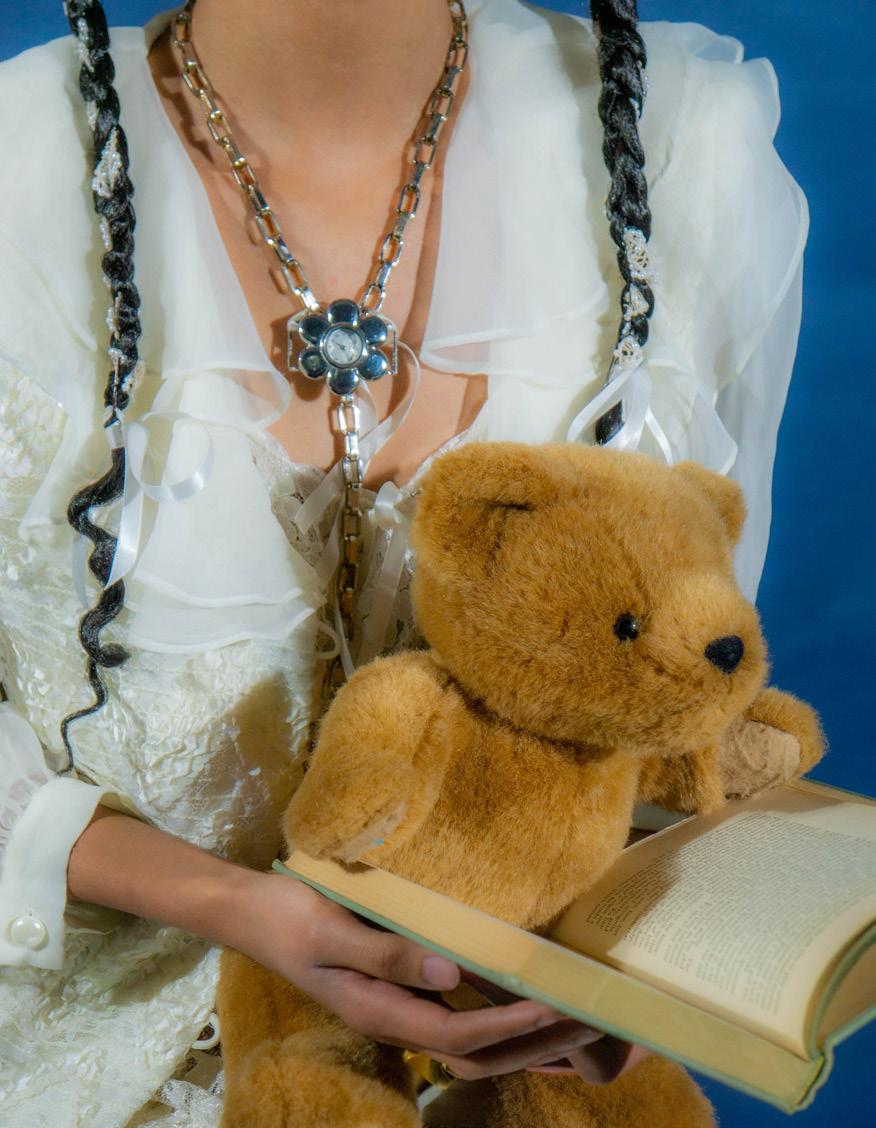



Growing up, I and many queer people I know have felt some level of disconnect from our biological families — anything from slightly strained relationships to broken or nonexistent ones. Maybe it’s because we feel they have to hide important aspects of themselves, or because of a lack of acceptance or understanding from our family members. It can be heartbreaking to long for those familial connections and not have them like other people do. As painful as these situations are, I’ve always felt that there is an inherent sense of family within the queer community itself. We’ve always wholeheartedly embraced more non-traditional family structures, and in recent years there’s been even more conversation about finding familial love in places beyond biological relationships. Wanting to explore this idea of found family, I spoke to other people within Orlando’s LGBTQ+ community to see how they defined family in their own words. Moreover, I wanted to find out what local spaces the LGBTQ+ community felt truly promotes queer connections and contributes to a sense of family and belonging.
Orlando has a strong queer community that’s bright and thriving. In the daytime, the Milk District is home to an assortment of local coffee shops, breweries, specialty stores, and markets where it isn’t uncommon to run into a fellow queer friend, or sometimes, even make a new one. When the sun sets, a vibrant nightlife scene takes over. Ceci Sendon, an Orlando resident, moved here from Miami for college. She told me that one of her favorite spots for a night out is Southern Nights, a gay nightclub and bar in downtown Orlando that hosts drag shows and theme nights. It’s one of those places that is bursting with life and color. “It’s definitely very open, very fun,” Sendon said. “I love seeing the drag shows – before I found Southern, I had never been to a drag show, or seen an all-gay girl burlesque group perform, or even danced with my fellow gays and just been out and proud,” she said. She told me about dancing with friends and seeing performances by burlesque group Les Vixens, and RuPaul stars like Roxxxy Andrews. “I feel like when I go to other nightclubs, I have to stay in a straight bubble. But I am a queer woman and I like to be able to exist openly as one,” Sendon said.
I spoke to Rye Standifer, an art student at UCF, about how they viewed family. “Queer people often don’t have those types of close family relationships just because, you know, family’s hard. Who knew?” Standifer laughs. “But, queer people who are going through the same thing can form those familial bonds with each other.” Others shared similar viewpoints about the Orlando community. UCF senior and art history club president Nathanaël LaPierre said, “My found family is composed of people that make me feel safe and at home, no matter the

found solace and a sense of belonging. Many of us are healing from our own wounds but we’re all still looking out for each other. There’s proof of this support not only in the bonds we’ve made, but in this city. The painted bandshell at the edge of Lake Eola. The rainbow flags pinned up in storefront windows like at Craft and Common (their iced banana chai is my support system). The
ourselves with people who make us feel loved and understood. Yes, we fight for each other and protect each other. We also laugh, dance, joke around, share food, and just exist as we are without fear of tension or judgment. To me, that’s what a family is at the heart of it. “When my friends and I are here together we get to forget about our worries and enjoy each other’s company in a place that feels like home.”
“I know you, I understand you, and I love you for all of it.”



When I first decided to attend a college almost four hours away from my hometown, my first thought was of my friends and family. I had to accept the fact that I would have to go several months without the comfort of my favorite things. As one could imagine, my heart was shattered. I knew going to college would be a good decision, but I didn’t want to leave the ones I love.
Additionally, I realized that leaving people behind wasn’t my only problem. While packing for college, it came to me that I couldn’t be able to take the majority of my possessions. Small trinkets, like old birthday cards and random snowglobes, didn’t fit in my suitcase. Even my blankie I’ve had since birth couldn’t make the cut. I had to prioritize my college essentials: bedding, clothes, hygiene products, school supplies, etc. And I did.
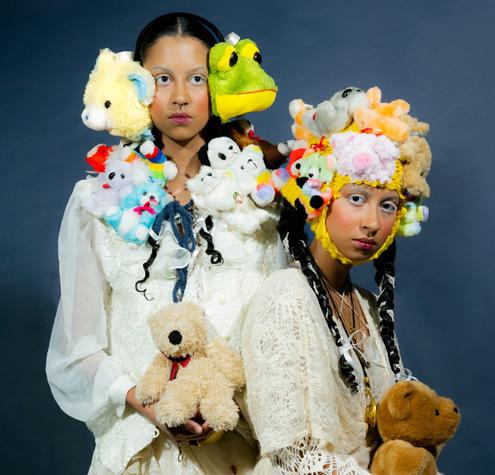

But what about all the tiny knick-knacks?
When I think back to my childhood, I don’t just think about the people in my life. I think about all the physical things that are associated with those memories. I remember the 5 Seconds of Summer tickets my parents got me for my 13th birthday, and the earrings my Nana let me borrow for my 19th one (that I never returned).
I remember the high school graduation cords I received after four years of hard work and all my sheet music from my marching band days. Even the paper hats I made at Steak ‘n Shake after Sunday morning church service still hold a place in my heart.
I had to leave all those things behind. College dorms aren’t meant to house all your childhood belongings. You’re not moving into your dream
house; you’re moving into a confined, shared space in a faraway city to further your education. College doesn’t give you the space to bring the childhood memories that have comforted you and shaped you as a person. You only take the necessities that help you survive in that environment. It truly is an unfortunate situation, but there is away to remedy it. Create new ones. College is where you create new memories. It’s where you join a club, get close to your roommates, explore the city, and so much more. With these things come new possessions, such as the first college sweatshirt I purchased. I didn’t bring it with me from home, but I remember going to the campus bookstore with my new roommates and picking out my favorite sweatshirt. Every time I look at that hoodie, I think of that memory.
You will always leave with more than what you came with. Don’t dwell on the fact that you can’t bring everything with you to college. Take care of the essentials first because all the little things will come to you later.
“Take care of the essentials first because all the little things will come to you later.”
In this stage of life, creating a chosen family is one of the most important things you can do for your past, present, and future self. If you’re unfamiliar with this concept, chosen family refers to people in your life who you’re not biologically related to but you choose to surround yourself with because of the unconditional love, deep trust, and emotional connection you share with one another. The process of creating your chosen family can be very healing, especially if you have had previous experiences with your ‘real’ family that are not necessarily positive. Whether you feel like you just don’t fit in with your biological family, or things have happened that have left you scarred with childhood trauma, or you simply want to expand your circle, you have the opportunity to make a family of your own. The formation of these bonds with people other than your blood relatives can fulfill some of the longings that may have been left empty as a child.
Sometimes we find ourselves held back by an embedded fear that prevents us from creating this chosen family. It could be a fear of relationships, being hurt again, or even a fear of the unknown. Occasionally, our past relationship experiences (especially familial) distort our perception of what healthy relationships should look like. This may make it hard to know what to look for when creating a chosen family, and it can also lead us to try to seek the validation and love we are missing from the wrong places. We often end up choosing people who only further damage our outlook on emotional intimacy. And after too many times, we find ourselves hurting even more, as if our past wounds just keep reopening without ever being fully healed. This can develop into a fear of becoming close with others and can make it harder to trust those we so desperately want to let into our lives. However, we have to overcome this fear and trust that not all people are the same in order to find those who will show us the love and acceptance we deserve.
Once we get past the fear holding us back from experiencing the embrace of our chosen family, we may find ourselves running into yet another setback: guilt. We worry that in deciding to surround ourselves with our chosen family, rather
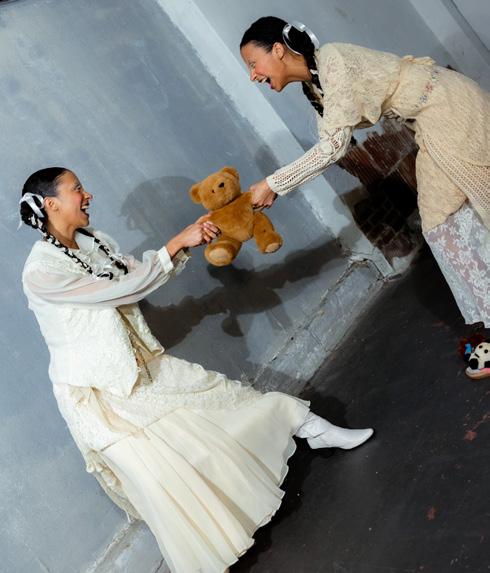
than our biological one, we are doing something wrong. But it isn’t about “choosing friends over family.” It’s about healing, and finding those who will help us through that process. It’s about making intentional relationships that will provide us with a true sense of love and support that we may have lacked in the past. As a child, we find ourselves in a painfully powerless position. We are always around those we share blood with, and while this may be a good thing for some, it can be very damaging for those who grew up in a toxic environment. Being made to feel constantly invalidated or unsupported can have a lasting impact on your mental wellbeing, and it can have an adverse effect on your growth as a person. It can have a negative influence on the way you view yourself and the world. But this doesn’t have to be permanent, because you don’t have to just sit back and accept mistreatment anymore. You can create a chosen family, and choose to form bonds with people who will love you for who you are and who will help you heal from the past. And this is not wrong.
But don’t take it from me. In an interview for
Apple Music, singer-songwriter Harry Styles spoke about this concept while discussing the story behind his heartfelt song “Matilda.” He shared how he got to know someone whose childhood was tainted with the wounds inflicted by their biological family. He explained how this inspired him to write a song for people who shared this experience and stated that this was “more important than me just making music about myself because I think it could mean more to a lot of people.” And he was correct. He found that countless people saw their experience reflected in the lyrics–which directly relate to the concept of chosen family. The track touches on the notion of leaving the past behind and surrounding yourself with people who will love and support you. In the song, he assures ‘Matilda’ there is nothing wrong with moving on and tells her (the listener) that “you can start a family who will always show you love / you don’t have to be sorry, no.” The reaction to this song exceeded his expectations, it gave people hope and made them feel like they weren’t alone. In his interview he said he wanted people to know that their past experience isn’t indicative of how it will always be and that they shouldn’t feel guilty for choosing a family that will love them unconditionally.
That being said, a chosen family looks different for everyone. Maybe it is a given that your biological family will be included, or you might be someone who is very forgiving and wants to give your blood relatives a chance to be in your new circle—or maybe not. Maybe your chosen family doesn’t include your biological one at all. That’s okay too.
The beautiful thing about growing up is that we can decide for ourselves to either let people stay in our lives or let them go. This opportunity to create our chosen family may be the first step on our journey of both healing and becoming. These unequivocal ties, since they are based entirely on unconditional love and genuine connection, can provide us with the sense of belonging and support we might have been missing. In surrounding ourselves with people that radiate an aura of acceptance and love, we can finally feel our wounds begin to heal and sense our inner child smiling ever so softly.





From below the surface, soft flesh in contact with the pristine white of pool concrete, arms wading calmly through the blue water, a younger version of myself stares up at the reflection of light bouncing off the wet horizon above me. Despite my innocence, the depths of the pool had become my enemy this day. Its waters had dragged me down to the bottom, yet I am still breathing. I wonder what would have happened if it had successfully filled my lungs.
I can’t breathe.
Would I have floated from my body, overcome with the feeling of guilt for not living to my full potential? Would it be dark, a monochromatic palette of emptiness accompanied by Death himself? Could I handle the liquid anxiety poured upon me as I walk into the next life with my hand joined with His?
Or would my eyes just shut, sealed forever from the world, while congenial company greets my naïve soul at life’s new gates?
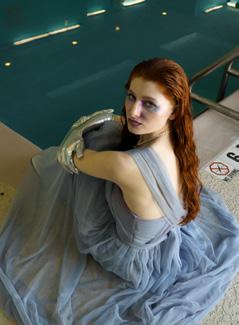
These visions have never been paired with fact, never been supported by reality. We think that the moment we take our last breath is the end but in truth, we are blind to what comes next. We have drowned in one way or another, unable to swim back up to the surface of the known.
The afterlife is a difficult concept to grasp, one that has been passed through many different tellings. Our childhood is flooded with memories of a god with fiery blue hair who cuts your line of life and transports you to a sea of souls. We have read stories told from the perspective of Death that end with us feeling pity for him. From ghost stories to tales of how a real person died and came back to life, we find ourselves both romanticizing and fearing the life after our own.
But there’s a fine line between living your life to the fullest and waiting for your last breath. When it’s drawn, doubt will arise as quickly as the spirit from your body. Have you done enough? Have you completed your goals?
Is everything after dark?
I can’t imagine.
Is living just to die our true purpose? The color within our lives is not meant to be diluted with the opaque details of death. We try to build a name for ourselves, try to speak it into the world with significance. That means there is no room for our mouths to get filled with murky water, no second chance if we go blind with power and forget our origins, our destiny.
I assume plenty go mad because of it. Their inability to comprehend what happens after our time on this earth is over; after our feet have shuffled in the dirt and touched lives smaller than our own, after our hands have raised to the
 by Nina Rueda
by Nina Rueda
boundless sky. The imagination developed to solve this enigma is as brilliant and bountiful as it is vacant. It’s genuine, but it’s never known to be real.
With the creation of these deathly theories, sunsets begin to seem fake, the oceans feel dry, and breathing fresh air turns into inhaling black smoke that fills our lungs with uncertainty. Sometimes we question if the blinding beauty surrounding us is worth the awaiting ugly.
I can’t find the truth.
Damn it, we’re not supposed to! It’s a mystery for a reason. If we focus on the unknown, then we’ll miss the known. If we swim helplessly against the beating currents, we will never appreciate the allure of the ocean. We should not want to remain in an endless loop of fear. We must push forward, let this life guide us forward in an effort to teach us how to swim correctly. When we are at the bottom of the pool, we need to push up. I am older now. Curiosity does not have to be the means to an end.
I can’t forget to live.
This world that has been given to us is plagued with fear, but it has also blessed us with the ability to feel it. We can feel the loneliness, smell the sweat perspiring from the idea of death. It’s scary, but at least we are able to experience it.
We can experience a lot of things. We can dive, we can fly, we can love. But if we’re blinded by the unknown for too long, what stops us from getting sucked into it? The kiss of death is not the act of death itself, but being controlled by the fear of it leads to the point of no longer living. I was saved from drowning, both a blessing and
a curse. Floating breathlessly on the bottom of the pool is an image I can only see from the perspective of my savior. I was young, and in my father’s eyes, it’s a blessing I am alive. Now older, I realize that while I can live, I am also capable of thinking of the future– of fearing death. That fear will never go away. Yet, I will continue to live with the acceptance that this life is it, and it’s mine. Ironically, so is my death.
I can’t wait to live, yet I don’t fear my own end. My lungs are spacious enough to hold both mortality and cessation. I can breathe underwater, eyes brimmed with tears ready to float above a world of silence.

DROWNING THOUGHTS DROWNING THOUGHTS DROWNING
DROWNING THOUGHTS DROWNING THOUGHTS DROWNING




Being from Florida, going to the beach is something I have always cherished and loved doing. I often reflect on the years of memories of building sand castles with my brother. Eating grapes and sandwiches for lunch and feeling a little extra crunch while chewing from our sandy fingers. Searching for sea shells with my mom to find new treasures to add to my collection. Spending all day in the sun and then showering to go off to a nice dinner with my family. I always saw the beach as something to look forward to but not something to run from.
In recent years, my family and I have always stayed at my aunt’s beach condo in New Smyrna Beach, the shark bite capital of the world, for our beach trips. This poses a bit of a problem for me, who is deathly afraid of sharks.
I love going in the water, pretending I’m a mermaid, and letting the waves woosh me around as I float beneath the beating sun rays. While I am able to enjoy the water for the first few minutes of being in, it does not take long for my fear to start creeping up. As much as I try to suppress it, part of me has a hard time remaining calm and not getting anxious thinking about what may be lurking beneath me. The further I get from the shore, the further my sanity gets from me. My mind begins flooding with thoughts of sharks circling around me, beneath me, or near me and while I love being in the ocean, there is nowhere else I would rather be less. The instant I feel a piece of seaweed swipe against my foot, I can’t help but be petrified, look around for any potential shark fins, and consider running out of the water.
Similar to my fear of a piece of seaweed being a shark, I find myself often afraid of what ‘could be’ in various situations. Getting closer and closer to the unknown and further from the comfort zone is no easy feat. Because what if the outcome is as bad as you can imagine? Seeing something at a surface level and not fully knowing the depth of what you may be stepping into can be daunting. Intimacy can be one of the worst cases. Not only in romantic relationships but in friendships, or with family members there can be the fear of getting too close to someone. Having a person see all sides of you, the good, the bad, maybe the parts that you don’t even want to acknowledge yourself is terrifying. Keeping a relationship at a distance where it feels like they know enough about you, without letting them in fully is staying comfortable. They may know your favorite movie or favorite song, but not about the ins and outs of your family problems. They may know about what you do for work or what you’re studying in school, but not the stress you face on a daily basis trying to juggle it all.
Allowing someone in to see who you are, can
bring in immense amounts of overthinking about whether or not you’ve been accepted. The fear of rejection holds a lot of weight. What if they don’t like you? Or, think you’re strange and make fun of you?
On the flip side, there is even the fear of feeling trapped and responsible for someone’s feelings when you get on a closer level with them. Opening up to someone and them opening up to you can make them feel a new level of closeness between the two of you, which you may not be willing or able to reciprocate. Holding someone’s trust and happiness may feel like an overwhelming responsibility that you may not want to handle, and in that case, you keep your distance.
The uncertainty of not knowing what is ahead can make anything a grueling experience. Something you may have once looked to with such high hopes and excitement can begin to look less and less attractive the closer it gets. Whether it be meeting up with people or following through with plans.
I hate to admit, I flake. I am guilty of coming up with some random excuse at the last minute so I can stay home- in my comfort space. I have used “Sorry, I completely forgot I have an exam tomorrow,” “I have a headache, I really don’t want to go out,” and “Oh, I forgot I have something going on with my family that day,” countless of times to get out of plans I was once so excited about.
It’s easy to stay comfortable, there is no uncertainty about sitting at home in your cozy fleece blanket, watching a rom-com you have gawked over millions of times. You know exactly what you’re getting yourself into. But doing something different from the daily routine like going to a big party or meeting up with someone for a first date? Oof that is scary, because what if it’s awful or something goes wrong? Why not just play it safe and stay home where there is a guaranteed good time?
Even bigger things you’ve always dreamt of can become seemingly less attractive as they approach. The thought of going off to the college you’ve been dreaming of attending since you were a child can be flooded with fears of not making friends. Or, the idea of finally going on the big trip you’ve been planning out for months, or maybe even years can be overtaken by the anxiety of something going wrong while away from home.
birthday you’ve looked forward to year after year can turn into dread as another birthday means another year of getting older and becoming more responsible. Doubts plant in our mind after such anticipation which is not only aggravating but contributes to finding comfort in the predictable.
Just like when I’m running out of the water because I think I felt a shark touch me,
It’s much easier to keep a safe distance, but what’s the fun in that? While it may be convenient to stay in a familiar place within relationships and opportunities, most times the things outside of the comfort zone can bring about the most joyful and life-altering experiences yet. On the flip side of the fear of what ‘could be,’ there is also the curiosity of what exhilarating doors could open.

“We run from plans or people when we think we feel something foreign to us getting too close for comfort.”

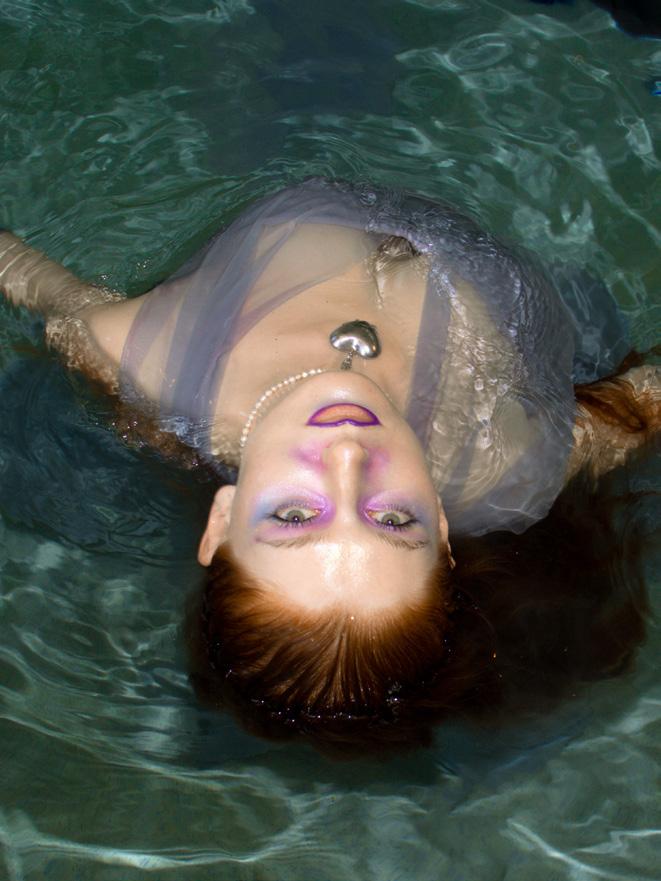

Afraid to grow up, you drown
Down, though you tread against the current Fear pulls you deeper
Trying to imagine the future
The unexplored depths of the ocean You float in nothingness
Above, the flickering light just out of reach
Below, a bottomless chasm
An abyss on every side
Helpless, weightless A spec of life in the enormity of blue
Insignificant in its vastness
Shadows lurking Danger nearing Blood running cold
Sharks circle closer
Receptors sensing your distress

Trapping you in fright
A rush of movement
Paralyzed by the panic
You shut your eyes
You don’t know where you are If you’ll ever be found Or lost in the unknown
You sink until your lungs ache
The crushing compression of change You can only hold your breath for so long
Until your feet graze the sand
And you know that if you don’t push off You will drown in the depth
Your lungs grow as you go
Up past the shadows
Out of the dark
Navy blue to baby blue
Salt to chlorine
Ocean to pool
Air filling your lungs
Grasping for the ledge
Unafraid of sharks in the pool

The sharks in my childhood swimming pool are still chasing me. The clothing pile shadows packed themselves in my suitcase and made a home in my dorm room alongside me. I gave my dolls away but sometimes I imagine my plants will grow limbs from leaves and suffocate me in the dead of night. I outgrew almost everything from my childhood: clothes, friends, passions; but I still can’t seem to shake the figments of my anxiety.
It’s been proven over and over that fear can cause permanent damage to the body and mind. Essentially, fear prepares the body for survival mode. Bodily functions that may help contribute to the survival of a dangerous situation are heightened through a sudden increase in certain hormones. The most noticeable example of this effect is increased heart rate, which happens because your body is preparing you to run away by pumping blood to the muscles as fast as possible. Bodily functions that aren’t as necessary slow down, such as your digestive system. People living with chronic fear or experienced long-term forms of trauma have an overexposure to these hormones, which can have detrimental effects to their health.
Fear can weaken the immune system, decrease fertility and even lead to quicker aging and premature death. Furthermore, fear can impair memory and cause damage to the hippocampus, which ironically is the part of the brain that helps regulate fear. Chronic fear can also impair your ability to regulate your emotions and make you more likely to act impulsively. In most cases, overexposure to fear leaves a person with a life-long anxiety disorder.
People who experienced an over-exposure to fear
typically have severe psychological impairment in the form of anxiety disorders or PTSD, which can be passed down to their children, grandchildren and the several generations following.
Maybe it’s the chronic fear talking, but that imaginary shark-induced anxiety has been a recurring theme throughout my entire life.
I’m not alone with these feelings. The American Psychological Association says that around 91% Generation Z experiences physical and emotional symptoms related to stress and anxiety. Some blame the frequency of mass shootings, others blame their experience with sexual assault. Most can agree that the environment in which they were raised caused a significant amount of stress throughout their childhood, which continues to affect them into their adult lives.
I so desperately wanted to be the exception, but unfortunately I can’t make myself immune to the trials and tribulations of growing up in a time where violence is the norm. At least my anxiety doesn’t make me an outlier amongst my peers.
I think my mother looks back on her childhood with fondness. She won the race against time and the internet, with its whispers of “You should look more like her,” or “Don’t go outside or this bad thing will happen to you” not quite seeping into her brain like it did mine. Not that her childhood was all good or that mine was all bad, but I so desperately crave the idea of coming of age in a pre-digital world. What I would give for those sharks to have shrunk as I grew.
The world is perpetually ending. The very concept barely means anything because every natural
disaster or tragic world event was thought to be the thing that would finally tip humanity over the edge. I sway between not caring at all and caring so much that the thought of going outside is enough to send me spiraling. Usually the latter. Is the environment in which I was raised to blame? Maybe growing up in a post-9/11 dystopia had something to do with it, although I don’t know how much something like that can affect someone still in utero when it occurred. Maybe my parent’s genes doomed me from the start.
I’m still the same little girl who would have panic attacks on the playground and sob in her sleep.
I wish I could say I look back on my childhood fondly, the way my mother and her mother and her mother before that can, but those damn sharks swim circles in my mind with their fins poking out of my subconscious like its ocean water.
by Morgan Ryan“Maybe one day I will grow strong enough to outswim them.”



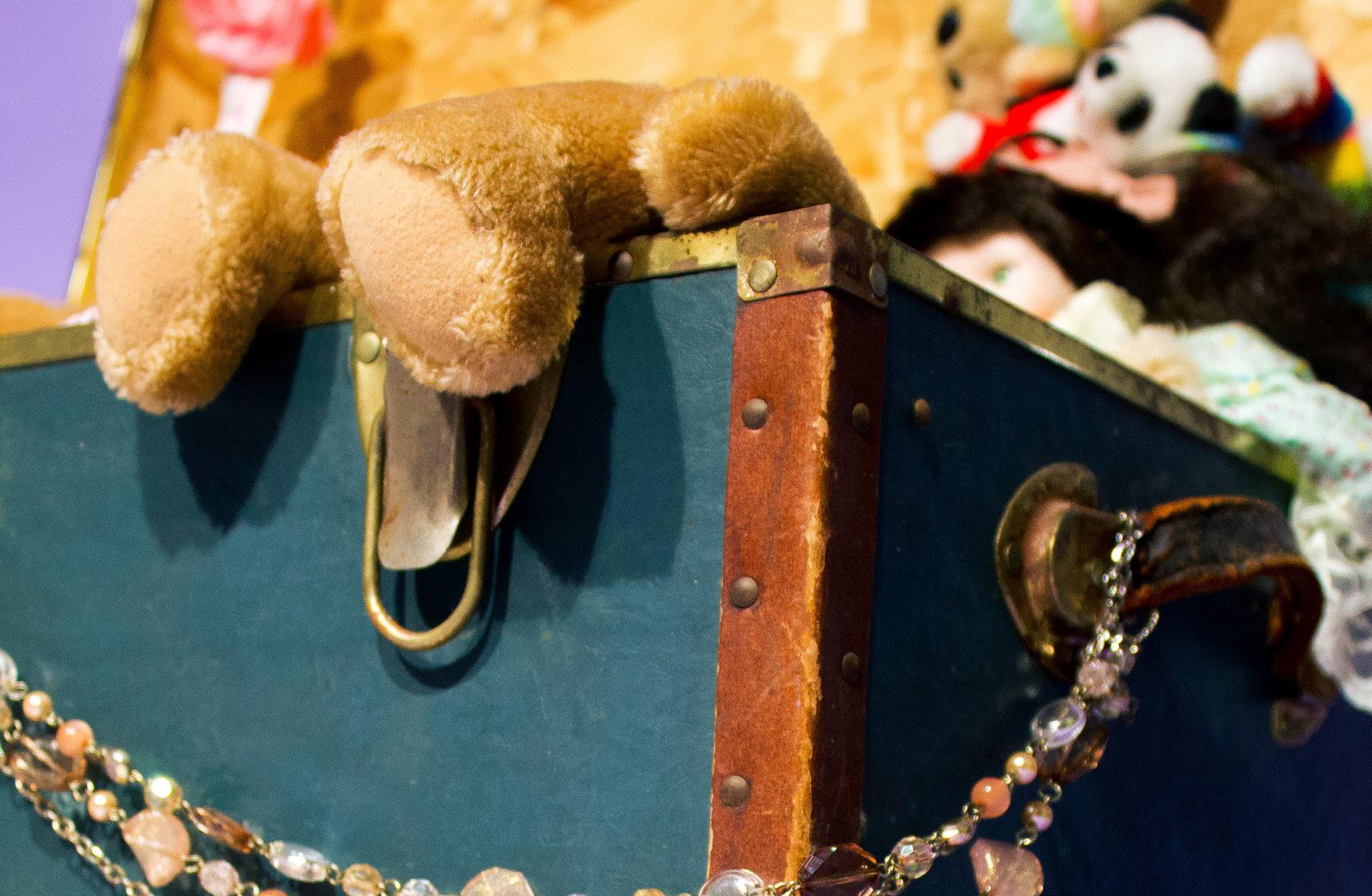



The essence of the young female experience is often presented similar to a viral Tik Tok trend–with an array of aesthetic skincare and a passionate “oh, how I love being a woman” with Hozier playing in the background. While all this seems nostalgic and coveted, what goes unnoticed is the price that comes with growing up a girl. And this is far more prevalent in our minds and lives than the understood tranquility of an “everything shower.”
All of the glitz and glamor of girlhood quickly dissipates when glances become gazes. Being the object of obsession by others from a young age is a degrading feeling that leaves girls feeling empty or that they are not worth anything more than their appearance. This goes beyond the way in which girlhood is often objectified and viewed as something of fascination. Despite the nostalgic aspects of girlhood that seem to paint it as being glittery, most of this is dulled by what is taken away during this time as a result of those around us.
Being a girl means being held responsible for other people’s thoughts or behavior. This is evident in the voice of your third grade teacher as he dress-codes you and tells you that “your shoulders are distracting.” However, wearing a top with a sleeve that measures three fingers in width isn’t the only thing that determines how other people view you. If your personality or interests don’t quite align with qualities other people think a young girl should have, this offsets their opinion of you. This leads to you being told you would be more likable if you were a bit quieter, or it would be better off if your pastimes were more fitting to your “nature.”
Forcing young girls to alter themselves and their behavior to fit a mold is a form of covert objectification that many people turn a blind eye to. From a very young age, we are conditioned to do whatever possible to ensure everything from our clothes to our behavior is appropriate and puts off the right image.


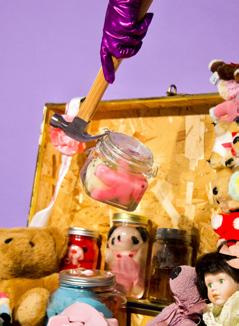
As we grow up this only gets worse, and people look to further control the direction of our lives. This could be as subtle as being guided to a career path “more suitable to femininity,” to as explicit as being told that college isn’t for you because of your gender (yes, this still happens). And other people’s behavior in regards to our appearance only intensifies with age. Corrections become degrading comments or catcalls, and looks become touches. Yet, unwanted attention and unwelcome advances are often excused by transferring the blame back to us for sending “mixed signals” or with the accusatory question of “what were you wearing?”
As a direct result of this, being a girl means living in constant fear. With no choice but to recognize the harsh reality of the world just to stay safe, we lose a lot of (what should be) time to grow up, have fun, and figure out who we are. Requests to go somewhere with friends or to attend sleepovers are often denied just because of a fear of the unknown. The top items on websites titled something like “50 Best Gifts for Teen Girls” are often pepper-spray keychains or personal alarms, and we know never to walk alone at night (or even in the daytime) or let our guard down in
a public setting. From a very young age we learn to compromise in order to intertwine safety measures with our everyday lives. Additionally, the effects of the way women are presented in society are incredibly prevalent in the lives of young girls. The pressure to look like the “perfect” models on the cover of beauty or fitness magazines often leads to low selfesteem and unhealthy behavior. Unfortunately, family and friends can be just as destructive in furthering the sting of society’s standards. Being told to “suck in” for a picture results in that becoming our automatic reaction every time we pass a mirror or show up to a summer birthday party. Seemingly harmless comments about our bodies or looks made by someone we care about can have a lasting, detrimental impact on our mentality. It seems girlhood is accompanied by a never-ending attempt to live up to the unattainable standards of others.
Taylor Swift encapsulates the concept of this stolen nostalgia perfectly in her song “Would’ve, Could’ve, Should’ve,” from her recently released album Midnights. While it presumably refers to her experience in a toxic relationship when she was young, many girls, myself included, took to an alternate interpretation upon first listen. Simultaneously alluding to specific instances of childhood trauma and the way society takes so much from young girls in general, I’ll never forget the moment that the lyrics made me feel like I was not alone in my experience. It was almost as if my younger self–the girl forced to grow up too fast, who was constantly criticized and discouraged from following her dreams, and who was taken advantage of simply because of her innocence–finally felt noticed and understood. This is why the bridge never fails to leave me shaking and teary-eyed, as “Living for the thrill of hitting you where it hurts / Give me back my girlhood, it was mine first” holds such prominent significance to me.
Reflecting on girlhood should be a sensation coated in serene nostalgia, consisting only of the sparkly sentimental moments that make up the popular aesthetic. Sadly, this is not the case. So much is taken away from us during this time that it leads to a distorted picture of our own adolescence (and of ourselves). Rather than sweetly reminiscing about our early years, we find ourselves flinching and trying to forget. But this shouldn’t be the way it is. That time of our lives belongs to us, it was ours first. It’s not something for others to control or toy with. And neither are we.
“Forcing young girls to alter themselves and their behavior to fit a mold is a form of covert objectification that many people turn a blind eye to.”


Often, it is wise to keep in mind that most adults are actually babies and should be treated as such. Not long after the start of a toddler playground playdate it is not uncommon to make the premature jump to the usually conclusive wailing and tears. This is not out of sadness or disparity for the playdate at hand, which one’s youngster self had doubtfully asked for anyway, but because a baby can simply handle so much excitement at once. Enough is enough. Nothing is wrong, it may just be time for a nap.
It is seldom realized just how much babyhood is left in our adult selves. We may not be a baby anymore, but the curtains should be drawn just the same. Our brain needs time to process, divide, and digest whatever welter of experiences are ingested. Registering anxiety is not a freakish phenomenon; simply, it is the logical mind’s plea not to continuously and exhaustingly be overstimulated. What can be physically achieved in a day is not always psychologically wise or plausible. There is no need for divorce, to abandon country, or to be retrained in some way. We may just need some rest. As it happens, even the tiniest tot knows that life will be a lot more manageable in an hour.
particular, though miniscule, significance in the thingamabobs that make up the material world of one’s life. Whether that may be a toilet brush with a tie of sentiment or a mug’s distinct and awwing mug, these are tools which help us through life, not what defines it. One’s personal vault of doohickies should not be treated with any empathy. There will be no voice of retaliation nor official complaint filed as consequence for stains or scrapes, cuts or bruises. A new color, a new shape, a new gimmick - it is much more often than not that something is not really nice, it’s just really expensive.
Through this we can ensure that the whatchamacallits we invest in and tire ourselves, and the world by making, are those that lend the most encouragement to our higher and better natures.
To pursue a simplistic article of faith is not to back away from challenge but is simply a sensory shift to where the real rewards may lie. Age is alive to the benefits of noisy living, and of course it would be pleasant to be extraordinary, famous and world conquering, but it may be a greater achievement to stay sane and kind; to recognize that truly satisfying things are available away from the spotlight. Let the sleepless competition win the ‘status’ race. What we can do more of is admit to ourselves that we are extremely tired, and that a pocket of quiet and ease can bring about the same charming lure as the eccentricity of praising rain. Boring, lazy, arrogant, sane and peaceful; like us, a chair - hopefully - will always be.
This truth lies within every slightly aged individual, yet we perpetually put aside any aim at scheduling caution for ourselves. Hours of the week slip away easier than the cigarettes from a halfdrunken modish girl’s box of light blue American Spirits on a night out. Every hour begins as the individual’s, though they just never seem to end the same way. And so we plan every week to the tee: see friends every night, run late to 10 meetings, two overnight dashes, drink 30 coffees, have five heavy meals after 8 p.m., watch four films and change four sheets; then we lament that our lives are not as calm as we’d like them to be.
Take a chair as an example, an object of true transubstantiation. It is as practical as it is physical. Standing, or rather sitting, as the embodiment of a positive spirit, of elegance, of honesty, strength and of straightforwardnessthe closer we get to it, the more we become a little more like it. If you’d just sit here for a while and rest, life might be just a bit more manageable. Much of the doodads which people are to own – by which they are likely to throw away and buy again in the next month – are flown through the purchasing hula hoop just to convince complete strangers of their surface level sanity. How about instead, buy it once.
by Patrick RyanSuch a privilege to have so much going on and so much to do; nevertheless, it will go on without us. There isn’t a need to carry such a loathsome hurriedness. Laziness doesn’t seem the most popular trend nowadays, but having layed and marinated for so long to which one’s sock may be taken off with the opposite heel in one swoop, has its perks. An utter understanding and self compassion should be consistently in the works, and the same goes for the objects which surround us. Inanimate, non-thinking whatsits are just that. Something which can’t simply say “when” once the sufficient amount of cheese is graded on their house salad or chicken carbonara, certainly shouldn’t be able to sway life in one way or the other. Therefore, there should be a
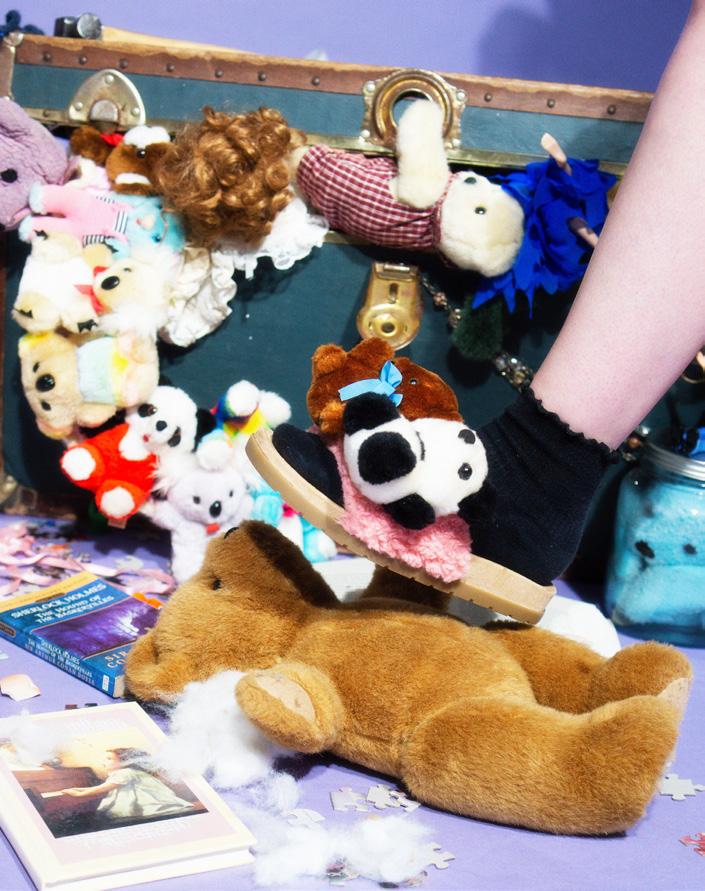
NOT YOUR TOY NOT YOUR TOY NOT YOUR TOY NOT YOUR TOY NOT YOUR TOY NOT YOUR TOY NOT YOUR TOY NOT YOUR TOY NOT YOUR TOY NOT YOUR TOY NOT YOUR TOY NOT YOUR TOY NOT YOUR TOY NOT YOUR TOY NOT YOUR TOY NOT YOUR TOY NOT YOUR TOY NOT YOUR TOY NOT


Gen Z is the generation of longing- we are all mesmerized by the past. We soak ourselves in nostalgia and bring back the good old days because it is our safe haven. Most of us were born into a world of dread, with the fear of the Y2K bug; it seems as if the times before us were much simpler and so comfortable. But we still find joy in all those past moments. Even if we look back and cringe at our childhood photos, we feel that warm, safe comfort in them. We find the beauty in all those mundane little moments we took for granted and want them back more than anything. We want to relive the beauty rather than just go through old photos because the past is so dear to us.
There’s a reason why styles like Y2K are coming back. We want to physically live in the past because we romanticize every little moment we grew up in. Everyone’s unique styles seem to be reworking and incorporating gems from the past. We bring in something new while hanging on to that comforting old. Gen Z is the generation of nostalgia and longing, and we look for comfort and security where we can find it. We want to go back to the bright bubblegum colors and a highly saturated world, back to a time when we jumped through sprinklers in the front lawn and blew bubbles and chased after the ice cream truck, waving crumbled-up singles from our piggy banks. We crave that innocence, bingewatching cartoons on Netflix and spending our paychecks on Sanrio plushies. We flock to flea markets for flared jeans and babydoll dresses and raid the attic for our parents’ old clothes and records. We want to recreate those funky, cheesy outfits we saw on the Disney Channel, knowing they were atrocious yet iconic and comforting at the same time.
So why are we so nostalgic? We are college students during the most expensive time to be alive; we dealt with a pandemic and inflation, and a lot of us reached our 20s in what is now known as the ‘year from hell.’

Nostalgia is beautiful and comforting. We want to mentally go back to that simpler, more secure time. A time before scrambling to pay rent or scrolling through Indeed, a time before failing a class meant a timeout and not having to repay almost a grand. Nostalgia is one big security blanket we all seem to need, so it’s justified to splurge that paycheck on Squishmallows, Lip Smackers, and baby tees.
Nostalgia is also a factor that will bring us all closer together. It is the best way for us to bond with one another. We’ve all seen those
by Ellie NasTikToks that state, “Only 00’s Kids Remember These Things,” and we all watch in awe as our screens are filled with flashes of Scooby Doo gummies, Trix yogurt, that giant ass rainbow parachute we all played with in gym class, and that time everyone seemed to be obsessed with mustaches and bacon. We’d cringe, cry about the discontinued snacks with enough food coloring to put our bodies into shock, and search up all those favorite childhood toys on eBay. The longing for the past makes us so human. We romanticize and see beauty in what we know; there is so much comfort and safety in nostalgia. We write poetry about jumping in puddles and hanging upside down on the monkey bars, and I think it is beautiful we find so much meaning in these tiny moments. The past is one big safety blanket.
The truth is, although we constantly find beauty in nostalgia, we often romanticize the past too much for our own good. The 2000s we long for were also filled with some not-soperfect moments. Being a kid could be tough, especially because we grew up in a generation where technology seemed to evolve faster than we grew. While we weren’t raised by our smartphones because we were still in the flip phone age as kids, it seemed the iPhone took over overnight and changed everything. Our whole world changed in an instant from AOL messenger to Kik and Skype. We saw technology overtake our lives, with Smartboards replacing projectors and clunky computers turning into iMacs. The more technology took over, the more our childhoods vanished. While we didn’t exactly replace playing outside with technology, it caused a cosmic shift in our childhood. While technology can be negative, we truly grew up in that digital age, so it’s something we are so used to. Even though we desire to go back to the past, I think we’d miss our phones and the information at the tips of our fingers. So while nostalgia is something we long for, we forgot how different it used to be, putting the good before the bad. There are things we can never go back to, like some Y2K fashion moments that refuse to make a comeback (though I happen to love skirts over jeans and those knee-high converse). And who on earth wants to go back to middle school?
So listen up, kid. Keep downing yourself in Kraft mac and cheese, bootcut jeans, and platform sandals; nostalgia is a comforting bliss we all need in our lives. Hang onto those things dearly, and keep writing poetry about pizza bagels and wearing obnoxiously bright colors to save your soul.

Do you ever stop yourself and ask why you wear makeup? Why do you dress in specific clothing? Or if you dress a certain way, why are you deemed ‘unkept’ or ‘lazy’?
During my childhood, I played with a variety of dolls, but there was always one doll that seemed to captivate my attention– the Barbie doll. The Barbie dolls I played with had blue eyes, silky blonde hair and were slim in their figure. I was a plump child with brown hair and brown eyes. Although some of the dolls I had were brunette, I remember admiring their perfect characteristics and hoping that I would look like the dolls when I entered adulthood. I wonder how many other children had these thoughts over the generations. Society has pressed people to look a certain way since we first started interacting with toys. Barbies have full makeup that help to set unrealistic expectations for children. Today, we are the toys of our society. We buy what is trending on TikTok, and succumb to the pressures of how to act in the presence of others. For women, we have been told we need to be vulnerable and polite. Women feel as though they always need to look presentable. I think back on how my Barbie dolls never wore sweats or had a bad hair day. I praised them for their perfect appearance. However, I am no longer playing with Barbie dolls. I feel as if I am a Barbie doll, controlled by the societal expectations put on women. The pressure to raise a family, look beautiful and act with the poise.
Mattel Inc. has lacked diversity within the Barbie doll franchise for generations. According to
by Marian SummerallBarbie Media, it was not until 1968 that the first African American Barbie doll was released. In 2016 Mattel Inc. released a line of Barbie dolls that varied in body types. However, the line only encompassed only three body types: tall, curvy and petite. With this release, the company also added more features including a variety of skin tones, hair and clothes. Nevertheless, the release in 2016 only incorporated three new body types in a world where each body is vastly different from one another. How can one relate to a toy that does not look like them? What if someone doesn’t fall into the category of petite, curvy or tall? How does someone grow into adulthood positively when they have felt misrepresented through their toys?
the article “Barbie: The Real Enemy,” the body proportions of the doll are so unrealistic that if the doll were alive, the original Barbie would not be able to lift her head or walk due to her neck and leg proportions. With these body types, eating disorders and body dysmorphia have been instilled into the youth’s minds.

The dolls also suggest outdated gender roles for women. The original Barbie had a career as a fashion designer. Barbie dolls are typically portrayed in stereotypically feminine roles such as designers or performing motherly tasks. After generations of Mattel Inc. producing Barbie dolls, the company started to introduce dolls with more roles in the STEM field. However, the Barbie dolls that were popular in my youth were the dolls with more stereotypical careers for women. Barbie dolls allude to the notion that women cannot have the same opportunities that men can have. Some of her early careers include a babysitter Barbie and a ballerina Barbie. This sexism integrated into the doll alludes to consumers that women must focus on the traditional roles of cooking, household duties and careers associated with feminine attributes.
Barbie dolls have always helped to uphold expectations for women. The dolls are structured and thin, conveying to people who buy the toys that the idealized body is a thin body. According to Johnson and Wales University, in
Mattel Inc. continues to manufacture Barbie dolls that negatively affect women today. As an adult, I look back on the dolls I played with and how today my body is still drastically different from the typical Barbie doll. Women can also uphold the same careers as men. It is time to move away from the unrealistic expectations that the doll conveys, and start telling society that we are not your toys.
“I feel as if I am a Barbie doll, controlled by the societal expectations put on women.”





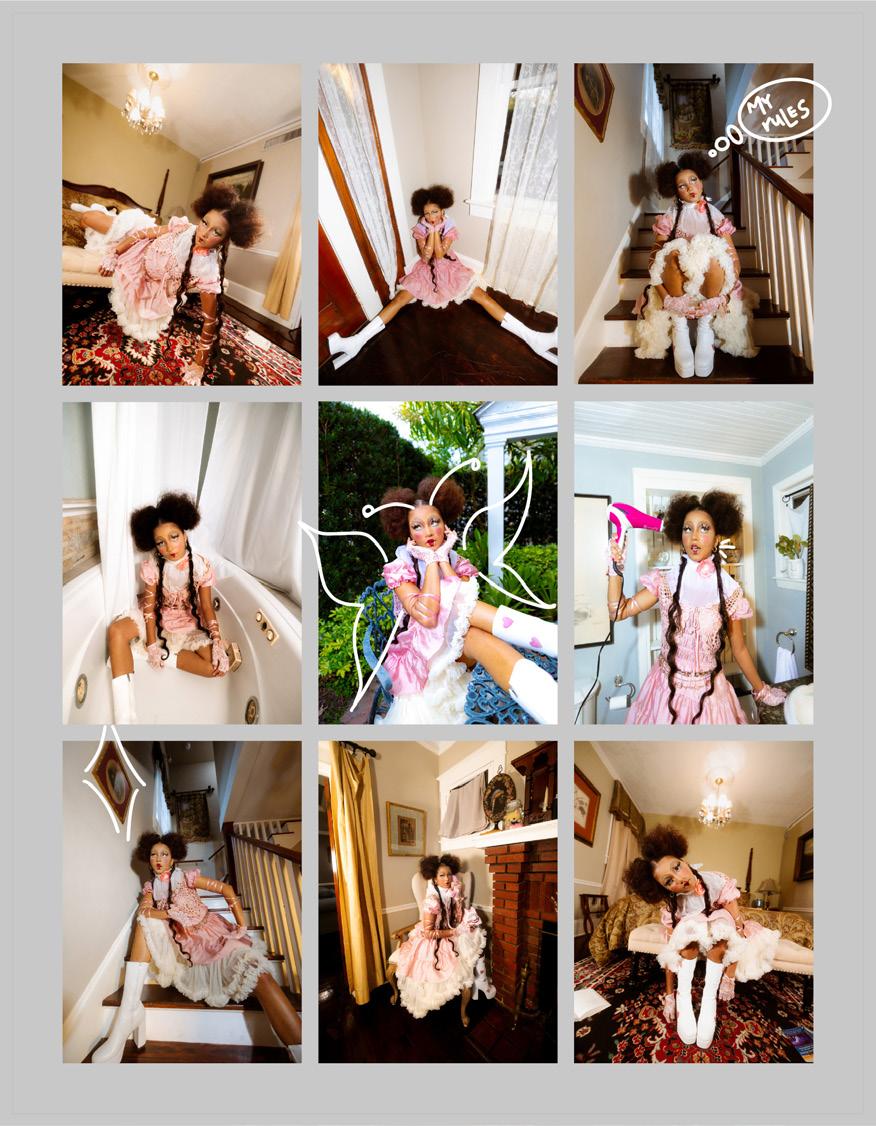
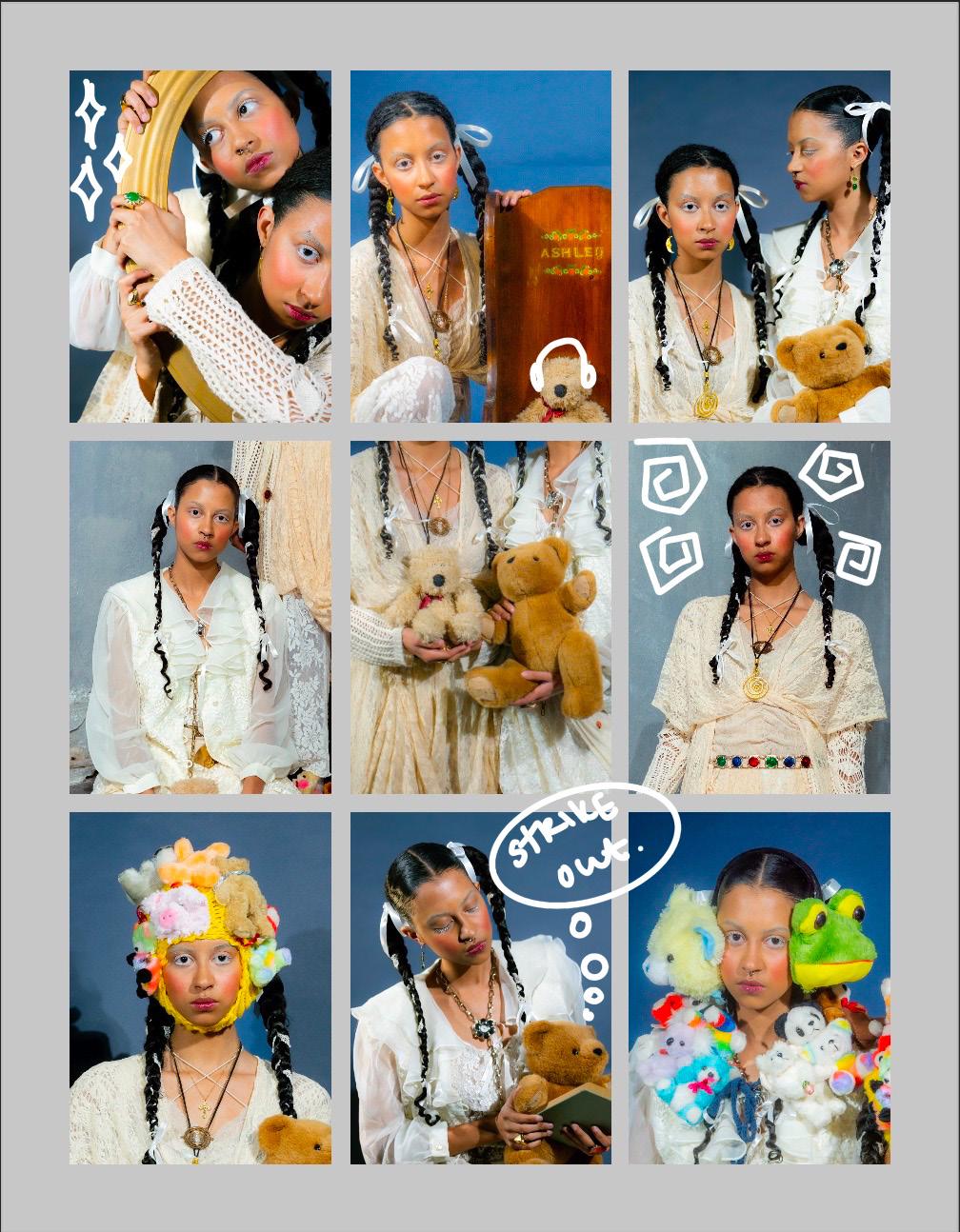





monsters under our bed
concept: grayson keglovic
editor-in-chief:
alexandra sullivan
creative director:
photographers:
models:
grayson keglovic
jackson ring, camila mojica
icarus evansen, patricia muñiz-villanueva
styling director:
stylists:
niah aleger
angelina curatelli, kiara alamo, marc anthony miller, sid theobald
beauty director:
beauty artists:
set director:
set designer: designer:
act my age
katherine polgar
kellen stephenson, coRa brady
ashlyn buckman
kendyl schumann
jillian proudfoot
concept: grayson keglovic
editor-in-chief:
alexandra sullivan
creative director: photographers:
models:
grayson keglovic
camila mojica, haleigh grose
richard rentz, mya cloud
styling director:
stylists:
niah aleger
angelina curatelli, kiara alamo, marc anthony miller, sid theobald
beauty director:
beauty artists:
set director:
katherine polgar
kellen stephenson, coRa brady
ashlyn buckman
set designers: designer:
emily paul, icarus evansen, kinou louis-charles
hailey kammerer
front/back cover: nayla villafañe
my

concept:
grayson keglovic
editor-in-chief:
alexandra sullivan
creative director:
photographers:
model:
grayson keglovic
valentina ramirez, keelyn hennighan
sky turner
styling director:
stylists:
niah aleger
angelina curatelli, kiara alamo, marc anthony miller, sid theobald
beauty director:
beauty artists:
set director:
katherine polgar
kellen stephenson, deanna kitchen, coRa brady
ashlyn buckman
set designers: designer:
addea coleman, kinour louis-charles
kiera mayott
chosen family
concept:
grayson keglovic
editor-in-chief:
alexandra sullivan
creative director:
photographers:
models:
grayson keglovic
valentina ramirez, riley karekos
kessa dryburgh, alana dryburgh
styling director:
stylists:
niah aleger
kiara alamo, marc anthony miller, sid theobald
beauty director:
beauty artists:
set director:
set designer:
designer:
sharks in the pool
katherine polgar
kellen stephenson, deanna kitchen, coRa brady
ashlyn buckman
callie cleary, kendyl schumann, icarus evansen
anna mclean
concept: icarus evansen
editor-in-chief:
alexandra sullivan
creative director:
photographers:
models:
grayson keglovic
camila mojica, haleigh grose
cj thompson, sydney diana
styling director:
stylists:
niah aleger
angelina curatelli, kiara alamo, marc anthony miller, sid theobald
beauty director:
beauty artists:
set director:
set designer: designer:
not your toy
katherine polgar
kellen stephenson, coRa brady
ashlyn buckman
icarus evansen
nicolas polania
concept: alexandra sullivan
editor-in-chief:
alexandra sullivan
creative director:
photographers:
models:
grayson keglovic
jackson ring, keelyn hennighan
gabby macogay, marie brooks, grayson keglovic
styling director:
stylists:
niah aleger
gabby macogay, katherine polgar
set director:
set designer: designer:
ashlyn buckman
callie cleary, addea coleman, kinou louis-charles, madison versaggi
hannah tucker
Thank you to Strike HQ and the Strike community for supporting us and giving us this platform to create something special. Thank you to our community in Orlando for your continued support and love. We couldn’t do it without you!

